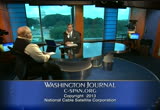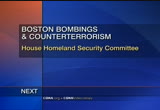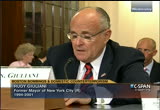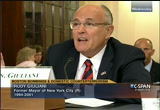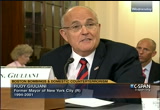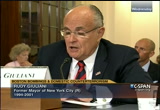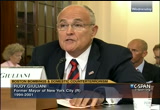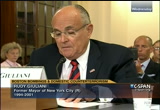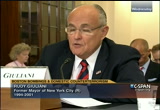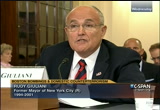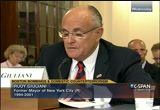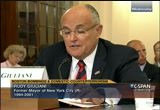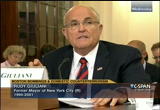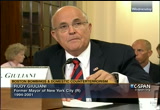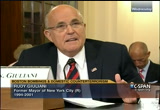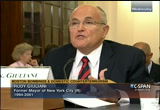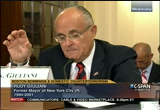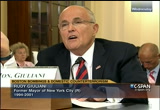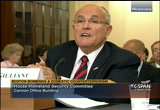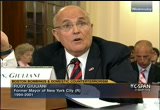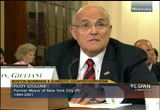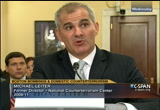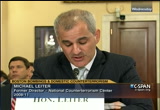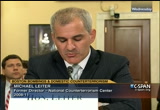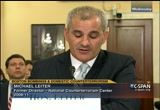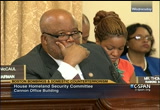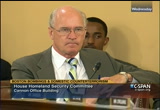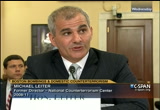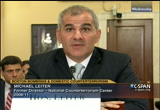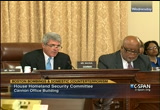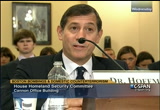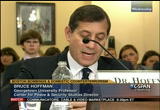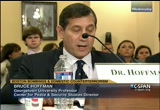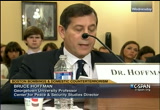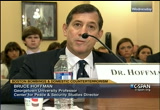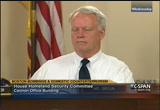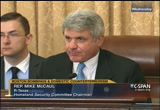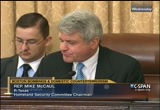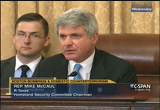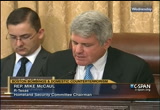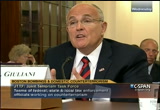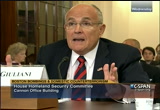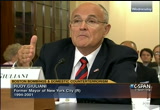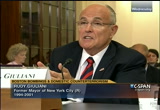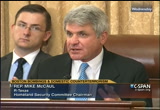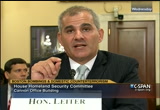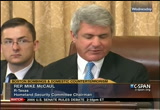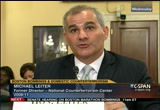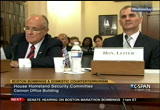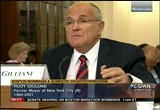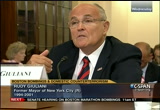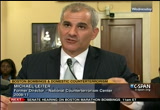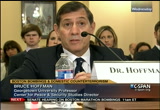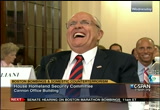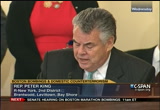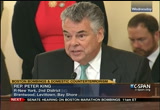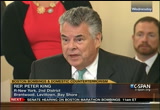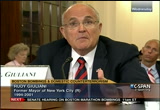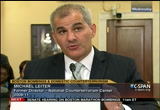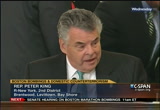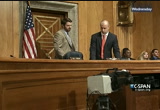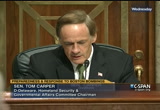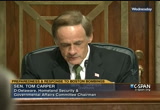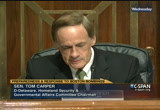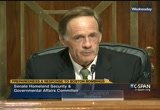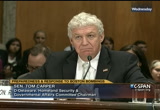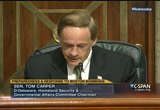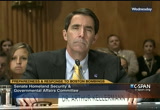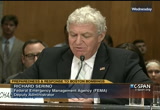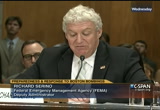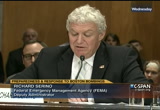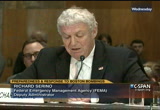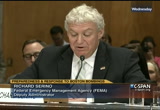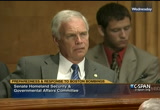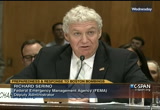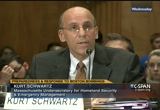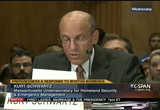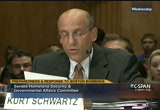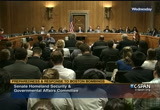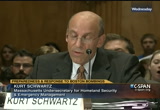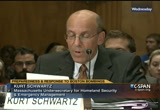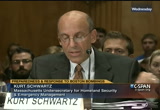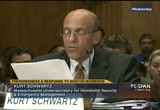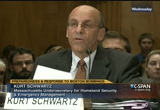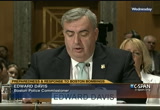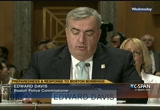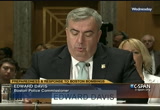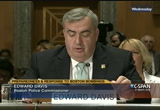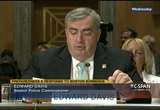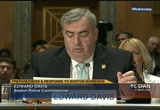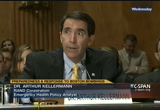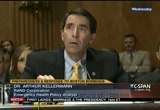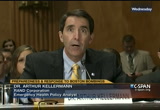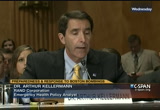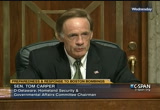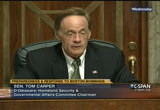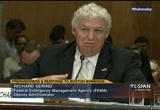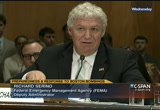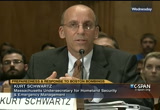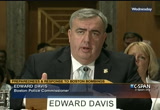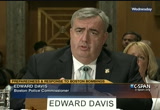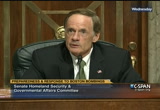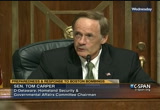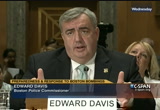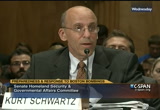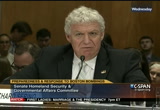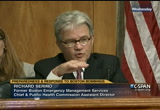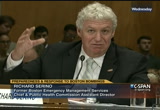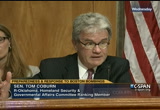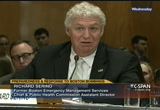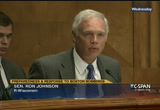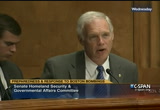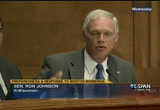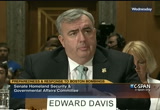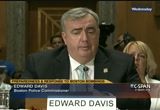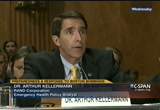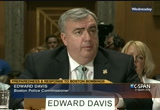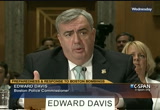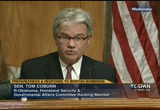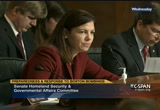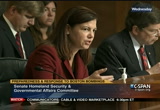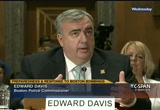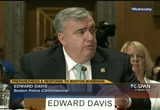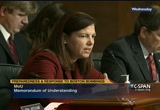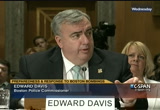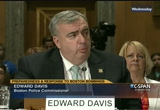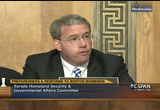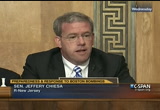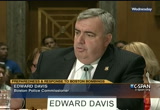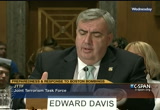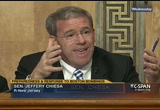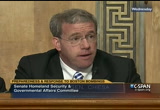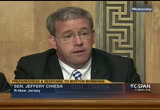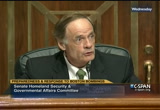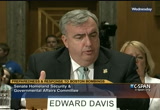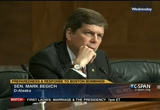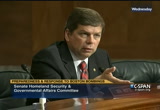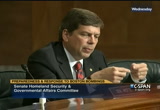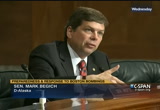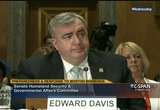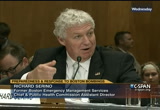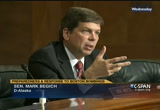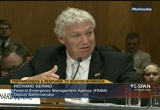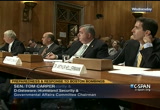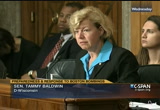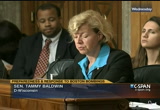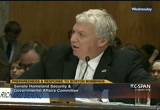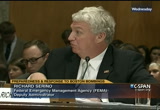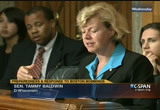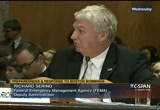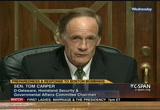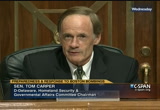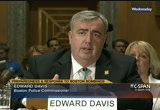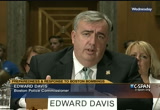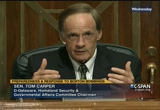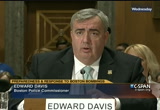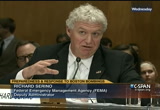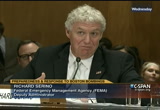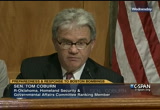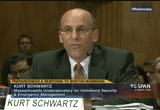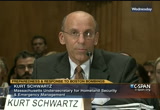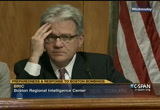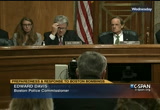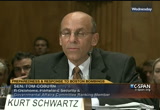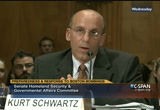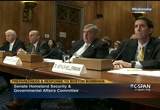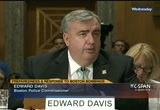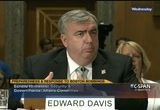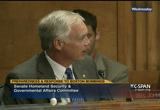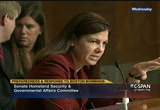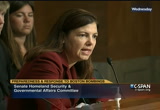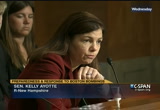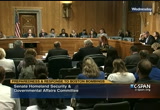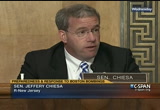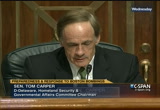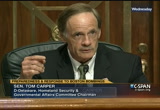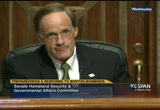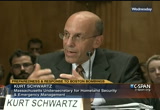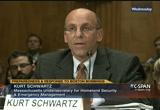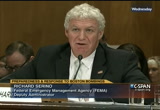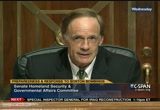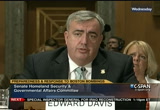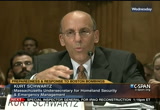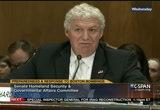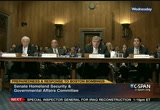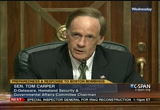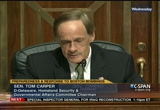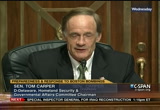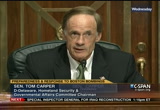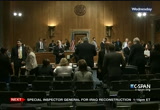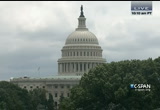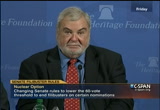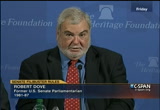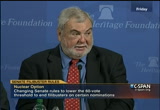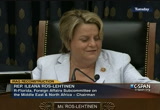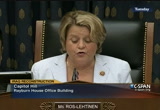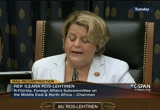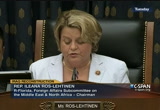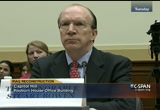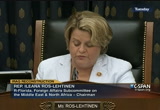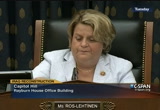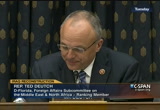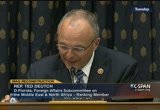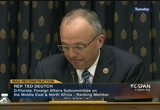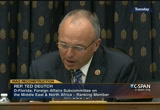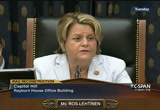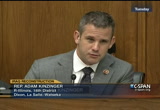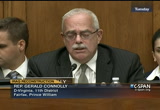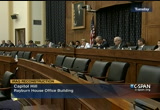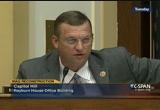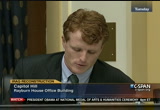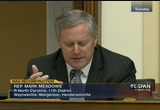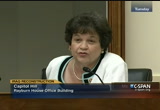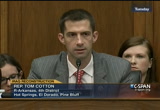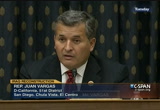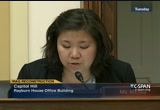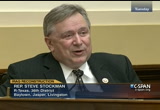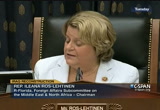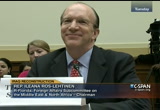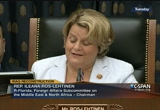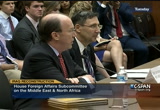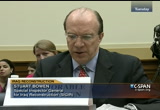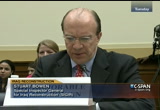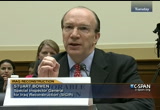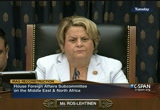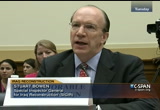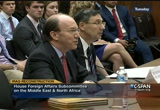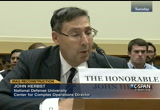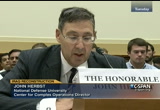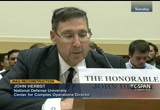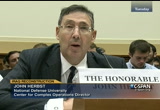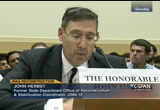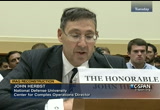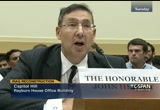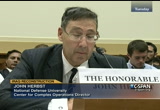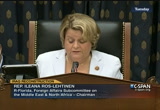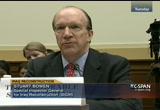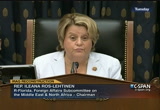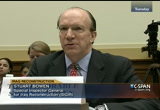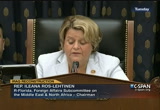tv Washington This Week CSPAN July 13, 2013 10:00am-2:01pm EDT
10:00 am
, some >> today on c-span of the house and senate homeland security hearings on the boston marathon bombing followed by the special inspector general for iraq reconstruction. the they house homeland security committee hears testimony from rudy giuliani on the boston marathon bombings. witnesses also include a national counterterrorism center former direct or and a georgetown university professor. this portion of the hearing is one hour. >> it is a privilege to testify
10:01 am
before you on this important subject. since september 11, there is rarely a day that goes by that i am not asked by someone, are we safer today than we were before september 11? the answer to that question is never a clear yes or no. in some ways, the answer is yes. in other ways, we have not given it enough attention. we have not anticipated because we cannot anticipate everything. the prevailing view right now among most security experts is that we have improved our safety and security with regard to attacks by air. we have improved our safety with regard to attacks by very large well-recognized terrorist groups. we are now much more of own herbal to attack by either
10:02 am
single individuals or much smaller groups who are acting on their own. we have seen a few recent attacks like that, boston being one of them, little rock, fort hood, the attempted attack in times square. the air attack that was foiled over detroit. the one in boston was probably the one that is the one that got everyone riveted around the idea that the single or small attacks are something we have to worry about. they really are not new and they have gone back quite some time. maybe in some way, it is a failing that it takes us so long to identify these things as a new method of attack. a new method of attack in boston
10:03 am
goes back to at least 2005 in london when a very similar kind of thing happened. homegrown terrorists in england, people who are uk citizens, attack the city of london. it just so happens i was there that day. we all should've been alerted to the fact that this is a deliberate part of the islamic extremist ideology to use single individuals, smaller groups, as a way of attacking us. bin laden was encouraging people to do that. maybe one of the things we can examine is why it takes us so long to recognize this as a new form of attack when this is a very old form of attack. the individuals on the small groups that do these attacks largely operate on their own, but usually, there is some training more encouragement from
10:04 am
a more organized or established outside group. with outside encouragement, sometimes with support him at very rarely completely on their own. the self generated terrorists operate in ways that make them much harder to detect and sometimes just as dangerous as the more highly organized groups. they are more difficult to detect because they engage in many fewer electronic wire communications with organizations that we have under physical or technological surveillance. or that we have infiltrated with undercover agents. a large international group that will carry out a plot almost has to trip over some of our things that we have put there to detect them. they have to communicate by phone, they have to transfer
10:05 am
money, equipment, move people. they are most always have to deal with someone giving us information. the chances of our detecting a large well-organized plot is much greater then a young man or two young men and boston or new york planning on their own to do this. maybe they make a few contacts, but they are hard to find in the avalanche of information that comes to intelligence services every day. one or two people motivated on their own i reading inspire magazine, following jihadist website. it would be foolish to have nor the fact that some mosques inspire jihadist terrorists. the first attack that shocked the country was inspired in a
10:06 am
mosque in union city, new jersey, by a muslim cleric who is serving 100 years in prison. these are much harder to detect. these individuals can be extremely dangerous. although they operate independent of one another, and it is perfectly accurate to describe them as independent actors, sometimes that is deceiving because these independent actors are connected by a very well-defined common cause. islamic extremism. even if no single act of theirs can do the damage of a september 11, 2001, smaller more frequent attacks that can kill people, shocked the country, show how vulnerable we are, can just as well serve the goal of these jihadist groups, which is to try to frighten us, destabilize us,
10:07 am
make us become less confident in our system of government. how do we deal with the sporadic smaller groups? how do we change our approach to terrorism so we can detect them? as a threshold matter, we should not begin by stopping doing what we're doing on a larger larger groups. this has been a very effective and it would be unfortunate if we were to take some resources away from dealing with the larger groups in order to deal with the smaller groups. this should be an expansion of what we do rather than a contraction of what we do because these groups still pose a threat to us. it may be this new method of terrorism is new to us, but it is not new to them. the old method is still very much alive and well. these large groups are planning
10:08 am
somewhere in the world to bomb us in some kind of a spectacular way. any attempt to back off that, the thought we have conquered them, would be exceedingly unrealistic and very dangerous. we have by no means conquered well-organized islamic terrorist groups. whether we recognize that we are at war with them, it is completely irrelevant. they are at war with us. are we going to recognize they are with or without us or we going to fool ourselves into a very dangerous state of denial? the first thing we recognize about these smaller groups, we have to identify them with precision. find the common threads, the shared motivations and then
10:09 am
hopefully, as early as possible, you catch the serial killer. if you go on for years not recognizing the common threads, being afraid to identify the common threads, because you are so frightened of political correctness, those killings go on interminably. it is vital we identify our enemy correctly. it is very hard to find someone you do not identify correctly. these attacks on our homeland and others have been connected by a common motivation and the singular purpose. the underwear bomber, the times square attempt, the tsarnaev brothers were all adherence to the jihadist goal of islamic domination and the murder of free people who they regard as
10:10 am
infidels in order to accomplish that goal. analyzing the avalanche of data presented to intelligence every day, we often describe it that these people are looking for a needle in a haystack. it is not just any needle, it is a needle that has very clear identifiable characteristics. in order to confront this threat effectively, we have to purge ourselves of the practice of political correctness when it goes so far that it interferes with our rational and honest analysis of the identifying characteristics that help us to discover these killers in advance. for example, there would have
10:11 am
been a much greater chance of preventing fort hood and possibly the boston bombings if the bureaucracies had been less reluctant to identify the eventual killers as potential islamic extremists terrorists. bureaucracy's response to the message they get from above. it requires understanding that the signal sent by a chief executive, the president, governor, mayor, the head of the fbi, affects the behavior of bureaucracies. the message conveyed from the top that it is inappropriate to label someone an islamic extremist will make bureaucracies reluctant to pursue leads that would otherwise be pursued. you cannot fight an enemy if you do not acknowledge. if the party line is to never
10:12 am
use the words islamic extremist terrorist, there is a reluctance to label something as the jihadist act. the bureaucracy is paralyzed by a greater fear of being wrong that they will identify someone as an islamic extremist and they will be wrong about preventing a bombing. the elevation of political correctness explains the failure to identify the major as a terrorist despite repeated indications of his jihadist views. it led to him being promoted in the united states army. that political correctness has been extended so far that the current administration describes his act as workplace violence.
10:13 am
this is not just preposterous, this is dangerous. it leads to all sorts of mistakes being made by the bureaucracy who realized they cannot identify people correctly without creating fear they will be in trouble. even to this day, it would be enormously helpful if the fort hood attack were described as an act of terror. we do not need to discover his motivation, he explained his motivation to us. i cannot be certain that that played a role in a failure to investigate with the vigor and the intensity that in hindsight seems should have been done. it is a question worth asking. what other steps have been taken if this fear was not so great that you might make a mistake
10:14 am
and identify someone as an extremist who was not? that is something required to pursue. expanding our defenses against these isolated or smaller groups is going to require a very different strategy. it will require a significant involvement of local law enforcement. if the genesis of this terrorism is domestic, the only chance to detect it is if the fbi and other agencies use local law enforcement as their eyes and ears. there are only 12,000 fbi agents in the entire world. or are 35,000 new york city police officers for one city. there are 800,000 police officers for our country. 12,000 fbi agents.
10:15 am
if you are trying to find a needle in a haystack in a community in america, the fbi cannot do it. i do not have the numbers to do it. the reality is they have to be trained in how to detect terrorism. former police commissioner, my police commissioner in new york, has developed excellent protocol called the precursors of terrorism. things police officers can be trained to look for terrorists. over the past 15 years and over the past 2000 -- i have been in law enforcement for 2000 years. knowing back to the 1960s, i
10:16 am
have worked with the fbi and the local police. the fbi has made tremendous progress in bringing in state and local law enforcement. it is light years ahead of what it was. the joint terrorism task force in new york city, i worked with in both capacities as the united states attorney and as the mayor of new york city. the level of cooperation is superb. i could give you one example after another of terrorist acts they have prevented in new york. the reality is, more has to be done in order to foster this cooperation. i do not know if the fbi properly notified boston police.
10:17 am
apparently, it did not get to the police chief about the information from russia. i think there was an obligation to notify. if the fbi receives notification from the government of russia that a man is suspected terrorist am at the fbi does not know if the man is a suspected terrorist but has to investigate, where would you go immediately? not just to notify them, but you asked for their help, you asked them for the information, you asked them to put them under surveillance. when the man engaged in a strange act of going to russia, it should have been a massive act, it should have set off all kinds of alarms.
10:18 am
his family left russia and obtained political asylum in the united states saying if they went back to russia, they would be persecuted. all of a sudden, you're going back to russia and nobody connected the dots. he was not going back to listen to the moscow symphony. he had to be going back for a purpose that was nefarious. those dots were not connected. that information was not passed on to the boston police when he returned. that is the area that i would examine, it would be a great benefit to law enforcement. did the connection get made? why didn't it get made? this is not the last act like this we are going to face. i think you have some very important questions to ask.
10:19 am
in assessing our level of danger, both president george w. bush and barack obama have warned us no matter how effective we are, we have to succeed 100% of the time. the terrorists only have to succeed one time. our response to terrorism and america must be subjected to constructive criticism and excruciating analysis. it must be free of political correctness and it must be constantly reevaluated. i respect what you are doing, thank you. >> thank you so much for being here and thank you for your
10:20 am
insightful testimony. >> it is a pleasure to be back in front of you. before reflecting on the five instances where our defenses were not perfect, i do want to begin with some of our successes. they are a lot more prevalent. i am always very careful saying this because the loss of 18 people is a tragedy and i do not want to underestimate that. i have met the bodies of our fallen soldiers, i have known people who have been killed by terrorists. frankly, in my view, it is nothing short of remarkable that since 9/11, we have had a total of 18 people killed in the homeland by al qaeda inspired terrorism.
10:21 am
these were all tragic and they have enormous psychological effect on the entire country, but in my view, this toll is astounding. i would venture a dangerous gas, if i asked the members of this committee on september 12, 2001, how many americans would be killed over the subsequent years, not one of you would say 18. many of you would say 1800. some of you might say 18,000. our record is far from perfect, but it is pretty good. the roots of the success come in many forms. incredibly successful offensive strikes in pakistan and yemen that have crushed al qaeda overseas.
10:22 am
excellent human and technical surveillance to penetrate these networks abroad and domestically. improve screening of travelers and cargo traveling to the u.s. improved information sharing among federal agencies, improve domestic counterterrorism intelligence investigations led by the fbi. very much done in conjunction with dhs and state and local authorities. as we saw in boston, first responder after an attack to reduce the consequences. finally, community engagement, especially with the american muslim community to reduce the attractiveness of the message. concrete results of this is a long list, but the 2011 arrest in texas, the 2010 disruption of the attempt to take down cargo planes by al qaeda in the arabian peninsula, the 2008 arrest, a 2007 attack at fort dix, and the disruption of
10:23 am
operational to down numerous airliners. our defenses are not perfect. i want to stress that, and i say this completely a politically, we have to accept that perfectionism is impossible. we do have to have realistic expectations so we do not have partisan witchhunt after the fact. it is far less likely that we have large-scale successful
10:24 am
attacks and it is significantly less likely that we have small- scale attacks, but even some of the examples the committee has mentioned as failures, i would note it is a layering of counterterrorism defenses which help make them not be successful. the case of times square, it is true that we did not identify him before the fact. one of the reasons his bomb failed was he knew the fbi had tripwire programs in place. if you bought a certain type of fertilizer, they would be tipped off. he bought a type of fertilizer that would not explode. in the case of the christmas day bomber, we fail to identify the individual, but what was al qaeda forced to do? use a detonator that was less likely to work. all of that being said, what are
10:25 am
some quick lessons i would learn from the five plot where we did not fully succeed? i think i have a slightly different view from the mayor, recognizing radicalization is critical. when he to improve our training, we can be afraid to train. ideas think that at least in the case of fort hood, a failure to recognize that process in the majors violent inclinations were a factor in not stopping the plot. in my 6.5 years working intelligence and counterterrorism, the idea that political correctness in any systematic way affected our efforts to find, locate, and either kill or arrest terrorists is simply beyond me.
10:26 am
second, al qaeda inspired messages on the internet are here to stay and we have to do more to understand them, track them, and disrupt them. i do believe the fbi, state and local officials need to work together more closely to allocate responsibility to monitor those websites that produce some of the radicalizing influences we have seen. i believe this is a current weakness. the shift from radicalization to mobilization is incredibly hard to predict. if we could put surveillance on everyone who is radicalized, this would be easy. we cannot. we cannot with federal resources or state and local resources. detecting that tipping point is the hardest piece.
10:27 am
it is not clear to me that there are resources in place that would've been able to follow him sufficiently to stop the shooting at the army recruiting center. information sharing within the u.s. government has to be maintained. the case of fort hood does represent [inaudible] it was a failure to share information between the fbi and the department of defense. this has to continue to be pressed. even in light of what we have heard about nsa surveillance, i believe this committee must continue to press the executive branch to make sure this information is provided to agencies that can connect the dots. joint terrorism task forces are critical and do excellent work. but they do not do everything. the lacking piece, which may
10:28 am
have been present in the boston bombing, those cases that the fbi cannot continue to investigate when they do not have the resources. in those cases, we must create a better system linking the fbi, state and local centers and authorities to pick up the smaller pieces. although we have invested an enormous amount in state and local fusion centers, they are not sufficiently tied together. i think you have known me for the past several years to be very committed to this problem. i would urge this committee to keep the pressure on the administration, but to also provide the service you must to the american people to convince them the members of the federal government are not spying for the sake of spying and you as the committee are holding the executive branches feed to the fire to ensure your civil liberties and privacy are being.
10:29 am
much of this cannot be spoken about in open hearings, but as much as we can, we must. without the trust of the american people, the fbi, cia, dhs, police departments will be looked at as the enemy. we cannot allow that to happen. thank you. >> the chair recognizes professor hoffman for five minutes. >> my humble apologies for being so late. thank you for the opportunity to testify. it is a great honor to do so. the al qaeda organization is widely seen on the verge of
10:30 am
strategic collapse. even though al qaeda may be in decline, the movement's ideology continues to resonate. the movement retains its visceral hatred of the united states along with the potential to inspire and motivate individuals to engage in deadly acts of homegrown terrorism. for more than a decade, al qaeda has withstood the greatest international onslaught directed against the organization in history. it is consistently shown itself capable of adapting and adjusting to even the most consequential countermeasures, having survived for quarter of a century. the oxygen they depend upon has
10:31 am
been its possession or access to physical sanctuary and safe haven. in the political upheaval and instability that followed, al qaeda has the potential to transform toehold in the sinai into footholds. while osama bin laden's death inflicted a crushing blow on al qaeda, it is not clear that it has been a fatal one. they are situated in more places than it was on september 11, 2001. it may take the presence of 14 different theaters of operations. some of these operational environments are less amenable than others, others have become sites of revival and resuscitation, such as iraq and west africa.
10:32 am
al qaeda has been able to achieve the unthinkable. radicalizing persons who are citizens of the united states and canada and inspiring and motivating them to engage in terrorist acts, whether on their own or at the direction of senior leadership. the continuing challenge the united states will face is that al qaeda's court ideology remains attractive to a hard- core radical and is capable of drawing into its ranks. the latest recruits to the struggle are the tsarnaev brothers.
10:33 am
the violence inflicted on muslims in general has been cited by many homegrown terrorists as the salient motivating factor in their politicization. this may also explain why the american invasions of iraq and afghanistan were cited as the reasons behind the bombing at the boston marathon. there is no one path to radicalization. individuals will always be attracted to violence in different ways. they come from every walk of life. the common element in the process reflects these individuals deep commitment to
10:34 am
their faith, often recently discovered, hatred of their adopted home, especially in the united states and the west, and a shared sense of alienation from their host countries. a dozen years ago, the enemy was clear and plainly in sight. it was a large terrorist organization situated mostly in one geographic location and it was led by an identifiable leader. today, when the borders between domestic and international are blurred, when our adversaries are not only identifiable terrorist organizations, but enigmatic individuals. we built an effective fence against the previous threat.
10:35 am
our challenge today is to develop new defenses against this individualized threat. continue to destroy an up and al qaeda its affiliates and associates and the ideology that fuels and sustains them. >> thank you, professor hoffman. it is the constitutional responsibility of this committee to conduct oversight into these matters, to get to the truth, but to find solutions. it is the intention of this chair to issue a report of findings and recommendations to improve the system where there may be failures.
10:36 am
mayor, i would like to ask a couple of questions. i agree with you that our inability to find the threat because of political correctness poses a danger to the safety of americans. with respect to boston, you have worked extensively -- you have a unique background you can bring to the table. you are high up in the justice department, a u.s. attorney, mayor of new york, you have seen all of the assets at play. after 9/11, the goal was to connect the dots. for the most part, they have been very successful. the ones i have worked with have been very successful. they are all in the same room, the walls of been taken down, they talk to each other. in the case of boston, it raised
10:37 am
some concerns to me. we had police commissioner ed davis testify before this committee. his testimony was interesting because when i asked him, did you know about the russian warning? his answer was no. did you know the fbi had opened up a criminal investigation? his answer was no. did you know that he traveled overseas? that was what they warned us about that he was going to travel overseas to meet with extremists and come back. the answer was no.
10:38 am
he did not know about it and the boston police department did not know about it. to me, that is an issue. to make the bold assertion that even if they knew about it, chechen rebels fight alongside al qaeda, to make the assertion that it would not make any difference because the case was closed raises a whole other set of issues. i talked to ed davis. the thing is, the hardest thing for me to say is that i did not know about it. i did not know about it. my guys know the streets. the fbi does their job. my guys know the streets. local law enforcement are the eyes and ears on the ground. you have 12,000 fbi agents nationwide. you have 800,000 police officers nationwide. 35,000 of those in new york. it seems to me -- 12 years after 9/11, and we still are not seeing that kind of coordination and communication taking place. when the fbi says we do not have the resources, why not leverage
10:39 am
state and locals? i want to help. the boston police wanted to be at the table. they wanted to know about the russian warning. there were not that many leads and there were not that many foreign threats coming into the boston area. this is a general question, but 12 years later, what has gone wrong? what can we do to fix this? >> i do not know if it is systemic or thing that happened within that organization. i do not know if the information was communicated so that one of the four boston police knew about this. and they did not communicated to their chief or commissioner or if it was not communicated to the police officers. it is hard to say. what i do know is if you asked me what does the new strategy
10:40 am
have to be to deal with this new threat of isolated groups, we are talking about a large international group like al qaeda. the fbi and nsa will be the main actors in trying to find them. if you are saying to me, our threat now are two young men living in boston or someone living in philadelphia or new york or las vegas, the fbi is not to find them. you will only find them with the local police. in my experience of 40 years of working with the fbi and local police, it seems to me the breakdown when happens, the fbi shares a lot more than it ever did for years ago, the breakdown
10:41 am
comes about if you really asked the fbi, they will say we cannot trust the local police. they might make a few exceptions. we can trust new york, we can trust boston, but we cannot trust a local police. they will leak the information because they are not as professional as we are. here is the reality, the fbi should confront them with the police department. go to the police department and say we can share information with ray kelly, but we have concerns about yours. we want to work with you to train them so we are confident we can share information. even the fbi has had leaks. nobody can be holier than thou. there is an obligation here that if the fbi is uncomfortable
10:42 am
sharing with local law enforcement, the fbi has to take the initiative to confront local law enforcement and get local law enforcement in that area to straighten out whatever the inadequacy is. we can no longer deal with this by not sharing information. we will miss other boston's if the federal government does not engage local police departments in a very big way. they are the only answer to finding these isolated single individuals, small groups. i do not know if this is the case in boston, i am giving you my experience. when i have confronted the situation of -- very often -- we are not sure about the reliability of this particular police officer, this particular unit. then you come to me in advance
10:43 am
and tell me you are not and let's straighten it out. it is important that we share this information. >> thank you. even at the federal level, we do not know if the fbi got the travel information on him. he has these radical ideas, youtube, he has a mosque he is kicked out of. the boston police know the streets. they could've taken a second look at this individual, what it did not happen. i understand that 20/20 is hindsight. i know the four boston police officers cannot even talk to their police chief. >> it would not have been the boston police department.
10:44 am
it would've been the cambridge police department, which matters because cambridge is a much smaller department. you are not always going to have a situation or the local police department is represented. to your question about what they can do, those boston or cambridge police department could've asked for permission to share that with their chief. that is so they know where the information is going. that is a good protocol. all too often, it means they do not ask at all. i do think that on a more systemic basis, we need to make sure when an investigation is concluded, that information is shared back with a host department so the department can decide whether using its own
10:45 am
police powers, it really should be concluded or whether or not they can do more where the fbi can't. as an attorney, there are real civil liberties issues here. in this case, we have a bomber and we say, we would have seen he was being radicalized. sharing information about someone who the fbi has investigated, they say nothing wrong. now we will let the local police have quiet surveillance? >> i would agree, but in this case, the russian warning, the threat was fulfilled. it takes it to a whole another level. it should have raised an additional level of scrutiny. i see my time has way over expired. >> finish your statement. >> i do not disagree that the travel overseas is something the
10:46 am
fbi would want to know. it did not change the agent's conclusion. when we share this information, which needs to be done for all of the reasons the mayor says. this needs to be done in a systematic way so that the boston police, the cambridge police can say these hundred cases the fbi is done with. do we care about them in some way? they also have to make the decision, is this ok? is this permissible under our local police authorities? that requires real oversight in massachusetts to make sure that is not being done in an inappropriate manner. >> this is an excellent panel.
10:47 am
i think we have picked up a lot of information. after we created dhs, after the unfortunate incident of 9/11, congress also try to legislate the culture of organizations by saying, and you must share information. we told cia you must start talking little more to the fbi. along the way, we ran up on something called need to know. from an intelligence standpoint. some of us say, what do you mean by need to know? we decide when we need to share with the next organization. mayor, have you seen a lessening of that? are we still caught in a culture of telling people just what you
10:48 am
want them to know rather than a full base sharing of intelligence? >> this confuses me because this is a situation of need to get help. it would seem to me that the fbi should have communicated with the local police, boston, cambridge, whatever, to get help. not just to let them know, the fbi was presented with a significant fact, the russians identified this man as a suspected terrorist. that could be valid information, and the fbi thought that russia is misleading us. where are you going to go to get information about this? russia would not give you any more.
10:49 am
the man lives in boston for quite some time. as a matter of help, you would go to the boston police and say, what do you know about him? that is what i do not understand. the need to know part, i think the efforts of congress, both presidents, a lot has changed to the positive. that is why this is a more unusual circumstance. 20 years ago, this would be the more usual thing to happen. the fbi is sharing much better now than it did before. i do not have the answer to -- i do not know why they did not go to the local police to warn them and to ask for their help in solving this puzzle. was tsarnaev a terrorist?
10:50 am
were the russians misleading us? >> i think it is still a problem. people will share now, but they will share once they determine that something is relevant a terrorism investigation. that is too late. the fact is, you have to share volumes of information across the u.s. government. there are often disputes about that. they say it is just travel information. you do not know if it is counterterrorism information until you have it in until you can compare it to other information and find between those dots.
10:51 am
in sure people are sharing core information they collect from the very start, even if there is no indication that it is relevant to an investigation. >> do you have some comments on that? >> the main challenge is how we interject the radicalization process. >> the chair recognizes the gentleman from new york, mr. king. >> i commend you for holding this hearing. this is going to be the rule rather than exception as we go forward. as far as lone wolves, the
10:52 am
christmas day bomber was not a lone wolf. he was trained by qab and sent out on a mission. thank you to all of the witnesses for their testimony. rudy, when i was listening to the introduction and he mentioned you being elevated to knighthood, those days we were taking the subways in manhattan >> i have not told anyone in brooklyn. i tried to keep it secret, but the chairman outed me.
10:53 am
>> if we can focus on boston, the boston police have four detectives with top-secret clearance. they were never told about the letter from russia. the commission nothing about it. the commissioner went back and found that during those seven years, his police officers and detectives had never been given any top-secret information by the fbi. i know it is different in new i was struck by this.
10:54 am
the fbi never told the nypd about that. it was greater when he found out that it for someone else this remained against new york. the excuse was he was in the hospital and he could not have carried out the bombing. no one knew who else was involved. way to carry out an attack on times square. i'm not trying to be a monday morning quarterback, but the fact that they stonewalled us lately since the boston bombing, i think that is unexceptionable. among all levels of government, the fact that the fbi is not sharing information with this committee has jurisdiction over homeland security is unexceptional. i insist that the fbi be more accountable to us. i don't mean this as a leading question, but do you think that jt efforts can -- jtfs can
10:55 am
function effectively question mark -- affect the question mark effectively? the fact is, had they gone to the boston police, they have so many informants on the streets, if they could have gone to them and said, "if you know anything about him." he was put out of a mosque in 2012 for radical behavior. that could have been known. that could have been brought to the fbi's attention. the fbi does not have informers working the streets at that.
10:56 am
i did not mean that as a being question. however, without that sharing of information between the fbi and the police, can we work effectively? >> the whole purpose of the jdf is to share information. any officer on that force should be cleared for classified information. this is the perfect opportunity to do that and clean up the problem that i mentioned earlier. if you go back to the earlier era of law enforcement, the fbi was probably correct that you could not share information with some local police departments or stop were unprofessional and corrupt and were not going to handle the information correctly. this is not true today. there are probably some exceptions. with the fbi should do is make
10:57 am
certain that they have the ability to communicate with local police. if that means going to the local police commissioner and saying that they have to tighten up their departments and solve these problems, the fbi should do that. particularly since the new threat that we are facing is one where we are looking for people in america's communities and neighborhoods. the fbi cannot do that. it confounds me. their failure -- not their failure to warn, but their failure to not ask for help. >> i think that is right. if you are on the joint terrorism task force, you should have access to this information. in this case, the question would be, what do those police officers do after the fbi goes out and interview tsarnaev and says, he is not right. let us assume that that was a reasonable conclusion.
10:58 am
how can police pick up what the fbi no longer can cover question mark -- cover? i do not mean to be an apologist. the fbi had visited that mosque in the past. that is an important role for the fbi and others. that cannot happen here. we have to encourage the fbi and state and local authorities to engage with mosques in the same way that they engage with all community organizations. >> the fbi never told anyone on the jttf. even after the brothers pictures were -- brother's pictures were all over the the internet and the world, nobody said anything. it is ridiculous to call before it would mask or workplace violence. i want purple hearts for those who were killed and for what.
10:59 am
11:00 am
let us good morning everyone. those were seated and those who are standing. less than three months ago the city of austin -- of boston suffered a horrific terrorist attack during the 117th boston marathon. he was there, my son. not as a runner but he was there as people came in from other schools to help be part of the
11:01 am
celebration. claimed the lives of three observers and close to 300 people. witnessed the first successful terrorist of bombing in u.s. soil since the september 11 terrorist attacks. as we did in the aftermath of nine/11, we must learn from the boston marathon bombing. that is why this committee has -- out the future time the committee will look at what this tragedy can have -- this tragedy could have been prevented. we will focus on the emergency response to the events that occurred on april 15, 2013. we will examine preparations made by the city of austin and the commonwealth of massachusetts to you with the crisis of this nature. also assess how the city
11:02 am
and state and federal government responded. one decade our country has worked to promote effective emergency response systems that help cities and states mitigate the effects of a terrorist attack. in the years since we have learnt that it takes preparation, training, and effective leadership and a coordinated response plan to minimize the impact and devastation caused by disaster. manyl accounts boston has of these elements in place on april 15 and the lives saved as a result. today's hearing will take us a step towards lessons learned and preparing for -- we will look at what worked, what we could have done that your, and how people in boston could have prepared communities across the country to compared the way to
11:03 am
deal with emergencies. to shed light on lessons learned by the attack we have three key officials who were on the ground the day of the attack. we are also joined by an emergency management manager that has studied the response of the marathon bombing. we look forward to hearing from each of you and working with others in the coming weeks and months to strengthen our preparedness across the united states. my colleagues have heard me say more times than they want to my values isof to focus on excellence in everything we do. us is if it isn't perfect, make it better. as well as a lot of people responded, people responded on the day of the disaster, the tragedy in boston, we know we can do better. .he key is to figure that out
11:04 am
with that, welcome. >> don't -- thank you. welcome to each of you and thank you for what you do. i will have a full statement for the record. i look forward to hearing your comments and testimony, asking you some pertinent questions about what we had done in the past, what help, what happens, and what has been effective and not. , he is notson really a doctor, he is just like me a regular guy. what we are going to do is briefly introduced the witnesses and ask each of you to share with us a statement and others will show up on our side and we will have good conversation. our first witness is richard serena. .eputy administrator he served as the chief of austin ams and assistant director of the boston health commission.
11:05 am
he has served as a commander for over 35 mass casualty incidents and for all of boston's major plant incidents, including the boston marathon. we look forward to your testimony. our next witness is curt schwartz. esther schwartz is the under secretary for homeland security and emergency management trade emergencyctor of the massachusetts management agency. he serves as home and security advisor through deval patrick. prior he served as assistant attorney general and chief of the criminal bureau of massachusetts. mr. swartz has also served as a please officer and emergency technician. next, mr. ed davis, currently commissioner of the boston
11:06 am
police department. he became the commissioner in december of 2006 after serving as a superintendent in the police department for 12 years. -- aey have a marked marathon in lowell? clocks charge of then overall response effort. we want to welcome you and thank you for your service. --inal witness is dr. author dr. arthur kelman. he was a professor of emergency medicine. he was chairman at the center of emergency care control at the
11:07 am
rollins school of public health. his research focuses on emergency health services. we welcome you for joining us. was recommended you be provided as a witness. i am glad you can join us. we are ready to go. you are invited to give us your statement, you can feel free to summarize if you wish. , you are our leader. collects thank you. good morning, i am richard serino. on behalf of secretary napolitano, we welcome the opportunity to be here to discuss the boston marathon bombing.
11:08 am
i was in boston that tragic day in april, celebrating patriots' day in my hometown. i am here today not just as a fema deputy administrator but as a bostonian and former paramedic. boston marathon creates a day like no other in boston. we's to celebrate our heritage and our streets fill with millions of residents to have visited from down the block and around the world. her most of my life i worked those street -- those same streets of boston. there were many nights i looked -- i went home proud to serve the residents of my town. in one moment we saw the terror and the talent he and in the next moment we saw compassion. ,e saw police officers firefighters, paramedics, emergency managers spring into
11:09 am
action and perform what they do perfect -- and perform what they do have row play. as tip o'neill used to say, all politics are local. boston was no exception. powerless to support communities like boston in their efforts to prepare or respond or recover from and mitigate whatever happens that they may face. as a political commander in boston for over 35 mass casualty incidents and for all of the city's major events i can assure you that the committee landing coordination at the local, state, and federal level played a critical role in ensuing a well executed response that did in fact save lives. among them today to express and discuss how it played a role in making the people on the ground more prepared that day, on april 15 american witness the strain of the whole community, people coming together and making a
11:10 am
collective response that much more effective and efficient. it reinforces the fact that fema is only part of the reinforcement -- of the management team. that april day we saw how fema approached natural preparedness and help them with the whole committee. through our preparedness, resources, and training exercise we help ensure that the people who responded had the tools and equipment to be effective area and immediately following the event fema collaborated with our law enforcement topics safety and is ready to help one president issued a disaster declaration. many of the communities demonstrated that they can -- as formerermath paramedic and sheet i can
11:11 am
attest to the importance that emergency medical and emergency personnel had contingencies. hadon and massachusetts federal grant funds that were critical inse, including helping stand up and emergency patient tracking system and a web based application that facilitates the difference. they were critical and crucial in the spun to the boston survivors. the massachusetts state police looked forward, looking at infrared imagery. these grants were leverage for on-site security protection, including much of the equipment that was used during the event, such as bomb robot x ray equipment,, helmets and vests.
11:12 am
since 2000, thousands of area responders received training under the emergency management institute, the fire academy. fema funds were also used to train swat teams to better integrate bomb technicians and critical capabilities that were demonstrated in boston. medical personnel were trained in how to respond to mass casualty incident. a was no accident that single hospital in the city was overwhelmed with patients about the bombing. it was no accident that patients and transported to hospitals in an orderly manner based on their needs. all of these exercises allowed key personnel to develop critical relationships.
11:13 am
exchange want to business cards at the scene of a disaster. fema right to self -- prides itself in collective preparedness to meet these threats created we know we can , orr replace martin richard those whose lives were lost in we can take some solace in the fact that a collective approach and the years of planning that we did as a nation on the local, state, and federal level helped first responders on the ground that they and saved lives. -- that day and saved lives. we will work with our partners across the country to honor and continue moving forward. i look forward to answering questions. collects double very much for that. -- >> thank you very much for that.
11:14 am
the committee, on behalf of governor patrick i thank you for the opportunity to share thoughts on the public safety response to the boston marathon bombings and the ensuing manhunt that resulted in the deaths of four people and injuries to hundreds more. the response to the marathon bombing demonstrates the value of our investment at local state and federal homeland security and within seconds of the array of personnel and resources capabilities, many funded with homeland security grant dollars, were mobilized and deployed. swiftlysponders provided emergency medical care to the injured and ems providers followed established plans to triage and support the wounded to trauma centers. andcenters were prepared existing mash casualty plans swiftly and effectively treated the wounded.
11:15 am
two of our, centers reported that critically injured patients were in operating rooms within just 15 to 18 minutes of receiving them in their emergency departments. tactical and other specialized teams, many of which deployed in boston under agreements, conducted monitoring and searched for additional explosive devices, established large security zones and secure the crime scene. a former -- a formal command center was established in a nearby hotel. political and public safety leaders began communicating with the public through learning systems, social media, and traditional media. the boston police have been supported by the state police read in only a matter of hours they combined their efforts and resources with the joint terrorism task force as the fbi took charge.
11:16 am
the speed by which the public safety agencies responded, supported by federal partners, is a testament to outstanding leadership and smart homeland security investments. passeston marathon through seven cities and towns and three counties before ending on boylston street in boston. for our local, regional, and state public safety officials, the marathon is one of our greatest annual events, drawing close -- drawing close to one million spectators. we are dedicated to operational resources to protect as best as we can the runners and spectators and the host cities and towns. these extensive lanning and preparedness efforts are to ensure readiness to respond to any and all unexpected hazards that written health, safety, or copy. on april 15 the public safety committee is prepared to as we have done for years the team spent months developing the
11:17 am
operational plans for this year's marathon. he did worst case scenario planning, preparing for a wide array of incidents and -- of incidents that may impact the marathon we conducted a comprehensive tabletop exercise. the center hosted an 80 person multi agency coordination center that was staffed with representatives of the ems agencies of the eight cities and towns along the course along with one dozen other key state and federal agencies. the operations center was connected to the emergency operation in all cities and towns and first responders along were using in operable challenges on radios to maintain effective communications. , local,e course
11:18 am
regional and state tactical mobile command post and helicopters were deployed as part of an hazards operational plan we were prepared and our high levels of preparedness were due to investments. a long-standing commitment to multidisciplined and multijurisdictional training and exercises throughout the state. cooperationord of by public officials and public safety leaders. an unwavering commitment i all privateegional and sector stakeholders and lessons from responses to hurricanes, tropical storms, ,lizzards, ice storms, floods
11:19 am
tornadoes and a massive failure in 16esulted presidential disaster declaration since 2005. even as we work our way to a comprehensive aftermath process themes stand out. there is a clear correlation between the effectiveness of amponse operations and local a regional state invest in trainings and exercise programs, building and sustaining ,pecialized give abilities enacting operational centers and our long-standing -- there are several other key factors that contributed to the effectiveness of response operations. the response relied heavily on specialized capabilities so that we can build and sustain our homeland security. the response to the bombing was
11:20 am
made for pre-existing mutual aid agreements. interoperability was a huge success story. the money was spent on interoperability a short communication. we benefited from sleep brand -- the -- preplanned offense -- events. we benefited from investments and regional exercise programs, such as the "urban shield." the collaboration across agencies and disciplines was immediate and extraordinary. the existing strong relationships between the commonwealth using center in the multiregional intelligence center and the joint terrorism task force allowed to say please and boston police to respond to the investigation led by the
11:21 am
fbi. the support from the federal government was immediate and effective and law enforcement saw every management group, including fema, hours after the bombings, including deputy serino. agencies communicated with the public through social media, reverse 911 systems, emergency alerting smart phone apps, and the wireless emergency alert service. the ensuing hunt for the suspected terrorist was nothing short of incredible.
11:22 am
the unprecedented request on april 19 that's for communities remain indoors. in closing, i mention that we are in the process of conducting a review. at the end of this process, a land will be published and we will continue to identify what worked well, where there is need for improvements, and where training exercises and homeland security investments would help. i concomitantly states that our investments made with homeland security enhanced our capability to respond to these tragic events. thank you. >> thank you for that testimony. >> thank you, mr. chairman. good morning. on behalf of the mayor, i would
11:23 am
like to thank you for the opportunity to testify today. on that day, two bombs exploded 12 seconds and 400 feet apart. two terrorist killed three people at the scene. 29-year-old krystle campbell. there were multiple amputations. every ambulance and police transport vehicle transported people to world-class hospitals. all my teen victims admitted in critical condition survived through exceptional medical care and the use of turning kids by civilians and first responders.
11:24 am
the photos were publicly released on thursday. the release of photos set up a rapid chain of events. the execution of a m.i.t. police officer and a carjacking that ended in watertown. there were explosives thrown. a shootout with the bombers that led to the critical injury of an officer. one terrorist was killed and the other fled. a massive manhunt ensued in a 20 block perimeter -- 20-block perimeter. it extended through boston. there were house-to-house searches. he was found in a boat storage in the back -- backyard. most terrorists were captured within 102 hours -- both terrorists were captured within
11:25 am
102 hours. i like to thank president obama and his administration, particularly the dhs and the department of justice for the assistance that boston received before, after, and during this event. the funding set a framework for multiple jurisdictions to work with one another in a highly effective manner. these agencies included "urban shield" training and collaborating on sunday -- scenarios that are similar. this associate in the efficiency and success of the subsequent investigation. this type of procedures reveal operational issues and allow us to correct them. there were also highly trained
11:26 am
and was in the boston intelligence center that were critical decision-making and deployment of information flow. boston received important technology that would not have been possible without federal funding. vehicles and robots -- contribute to the safety of public officers and the success of the investigation. all agencies and trainees work as soon as he as possible on the ground. it is clear that there is a need for an improvement in information sharing. policies and practices for information and intelligence series -- sharing must be consistent. language should be reviewed. including the restrictions that
11:27 am
members of the chief association chief's association feel need to be addressed. for sample, the association proposes regular briefings by federal agencies on all threats to the immunity. this is critical as it were to prevent violent extremes attacks in this country. we're meeting with the senate intelligence committee to get help in sharing classified intelligence that i cannot address in open hearing. the other issue was the overload to the cell phone system. cell phones were rendered completely useless. it was overrun by public usage. it forced a public responders to rely on radios. this experience with satellite phone technology shows that it is not effective. communication assistant -- assistance from the department of homeland security has made difference.
11:28 am
we've conducted an exercise during the previous boston marathon to test and train for communications. based on what has come from dhs's assistance, mutation systems work without incident. also both went down during the crisis. in the past, personnel would not have been able to mitigate because of radio systems. i want to reiterate that law enforcement needs a calm and secure bandwidth dedicated to public safety use, exclusively. we thank congress for working with the department of commerce to implement this long overdue legislation. this would address the problem we faced. we're successful ace on the support and assistance from the committee. i printed opportunity to discuss
11:29 am
things that was sussed my colleagues in the nation and around the world -- to discuss things that my college in the nation and around the world will benefit from. >> i am mark kellerman. i am not from boston. >> how about south boston? >> no, sir. we've all heard that it is better to be lucky than good. first responders were both. when, where, and how the attacks occur. boston responders are very good. bystanders and runners played a key role in the minutes after the attack. prior to the attack, boston police personnel studied how london, which rated, and other
11:30 am
cities had handled their terrorist attacks. what went well? what did not go well? they incorporated that into their plan. boston's hospitals did a great job because they were prepared. everyone knew what to do. that is how disaster plans work. these observations lead to an important point. the fact that boston is lucky and good does not mean that the next american city that is it will be equally lucky or good. we do not mean that you cannot assume that other u.s. cities are compared to manage a terrorist attack of a similar or greater magnitude. there is ample reason to worry. across the nation, emergency room crowding is as bad as ever. it compromises patient safety on
11:31 am
a daily basis. some hospitals -- not every movie has the spirit of boston where health and public safety were together. disaster preparedness is largely a state and local responsibility. the federal government has a role to play. you asked that i comment on two areas. i will address research. rand published research funded by civilian agencies in the u.s. government. we found that the current portfolio is skewed towards biological threats. two thirds of the cities -- studies address that. while natural disasters are focuses of only two percent of studies.
11:32 am
one reason for the heavy coverage of one threads versus the other is that the agencies today do not have a simple way to determine who is funding what or to prioritize which questions are most urgent. as a result, we are not getting value for our dollar. our work has been focused on hhs rather than dhs. i can tell you that performance measures that focus on what is being bought and caught is not as useful as those that measure whether or not states are building core capabilities. let me cite an example. is one thing to ask state and municipalities to self-report.
11:33 am
it is another thing to independently determine that that phone line gets answered at 2:00 in the morning and how long it takes for somebody to get back with information. the first is a capacity. the second is a capability. extensive, pre-scripted exercises are better than nothing. they are better -- systematic learning from the world events, small as well as large. the goal is not to make hospitals look bad.
11:34 am
it is to make them ready for when the big one happens. congress can help by encouraging federal agencies to promote teamwork at the state, federal, and local level. here's my bottom line. boston responders deserve our praise. let's do more than pat them on the back. let's follow their example. boston learned from the experiences of london, madrid, and mumbai. the rest of us can learn from boston. >> thank you. thank you for inviting him. i want to start off -- before i ask a question -- maybe for myself and my colleagues -- the idea, the thoughts that the stairs and casually -- terrorist tragedy occurred and people died on the scene.
11:35 am
printed below made to the hospital and they lived -- 300 able made to the hospital and they lived. some of them had no pulse. hopefully, they will have the support as they move on in their life. support of a different kind. the team of paid professionals, volunteers, bystanders, pulled together as one and it is extraordinary. we gather in the senate chamber to vote, over the head of the presiding officer in the senate and house are the only latin words that i know, from many, one. for many, one. -- from many, one. extraordinary.
11:36 am
the road to improvement is under construction. everything we do, we can do better. i'll give you an example of one lesson from the tragedy in boston that can be exported and should be to other communities, to other cities, and, our country. mr. sorino. >> i would say, make sure that the training and relationships are done ahead of time. planning is key. every community, large or small, has a vent -- events on the fourth of july.
11:37 am
building those relationships on a special event, because you know you have numbers of people concentrated and groups of people coming together -- for example, the fourth of july marathon -- building that and testing that. i think that taking the lessons learned from that and bring in the departments together, as i mentioned, it was no accident that people went to the prison hospital and were treated on scene with tourniquets. that is the training that happens for the special events and they were incorporated into everyday.
11:38 am
that has been done in boston for years. it should be done across the the country. >> thank you. mr. swartz. >> i will build on that. in addition to the training and exercises, we had to translate what we do in boston -- have to translate what we do in boston into our were-case capabilities. on game day, you have to be ready to act quickly. a marathon day, -- on marathon day, we had the operational capacity to respond to the worst-case scenarios. we had a agency coronation centers. -- we had a multi-agency coordination center. across all eight cities and towns, we had resources that
11:39 am
many people would say, why are these out there? with canines and helicopters, that is expensive to deploy. that is building the worst-case scenario operational capacity. when the bombs go off, there is not a delay and the reaction is immediate. the response is immediate. i am building on the worst-case scenario planning to implement that plan and on a moments notice. -- moment's notice. >> being prepared is important. i want to talk about medication. not radio communication. i have already addressed that in my statement. >> we're at it 800 megahertz system. do you use a similar system?
11:40 am
>> with cobbled together a system that works well. -- we have cobbled a system together that works well. let me speak about social media and establishing a relationship during the crisis, we have a significant presence on social media where we have engaged in a dialogue with people in the community. we use social media effectively to inform people where they can go and what happens. where they can meet loved ones.
11:41 am
we used social media to tamp that down. we reached out to the community to get clues and video and photos. we used it to correct things that have been reported badly by the media. our point is, a substantial investment in the utilization of social media to do public outreach to the community can help in any kind of event that happened like this. were able to reach people through systems that are funded in the public sector but utilized by the public sector very well. >> dr. kellerman. >> is important to get health care and medical community waters planning for spots.
11:42 am
terrorism the -- in terrorism, people get hurt. we have to make that work. the other thing i would emphasize is, you do not repair and then put things in a closet and lock it away the best systems are the ones that work well day-to-day. the most effective cities and systems in the country are those that are high performers everywhere. not just on the day of the disaster. >> thank you. i have been joined by other colleagues. the former attorney general, tammy baldwin. she served, with the stage and, in the general assembly of her state. kelly ayotte. and, a suggestible businessperson. -- successful is this person. -- successful business person.
11:43 am
>> one follow-up, you spent $4.7 billion, yet you are still using an old system, why? >> the money utilized was put into rebuilding infrastructure that is there. to build a new frequency would be more expensive than that. i am not an expert in this field. i know that we have look at it closely. the enormous amount of money necessary -- this is a system that covers 2000 square miles.
11:44 am
services of 11,000 emergency personnel. -- it services 11,000 emergency personnel. >> our first approach over the years was to take our different systems and as that we have regional plans and that all our systems can talk together. interoperability is a huge success story. we spent the late to make them talk to each other. it works. as he would get the possibility of using other bands, -- as we look at the possibility of using other bands, we expect that over the next 10-15 years, many of our partners will migrate to 700 and 800.
11:45 am
>> of the capabilities utilized in the boston bombings, which are the most important in boston and least developed in other cities question mark we've seen a stellar performance here. there's no question about -- cities? we've seen a stellar performance here. that's great. >> i may be a little bit biased about boston. one of the things that is positive in boston is -- as the commissioner mentioned -- is the communication.
11:46 am
people are on a first-name basis. the medical community has been linked in with public safety for years. not just since 2001. it goes back before that. the ability for the medical community and public health to link together so people can understand the language of both groups. you do not see that in many places across country. it is essential. the medical community and public safety committee have to be on the same page. as one thing that i think is key. in boston, it saved lives. >> you do not think that we are as well prepared and other cities in the medical community. >> advocate is opportunity that is gone very well in boston.
11:47 am
we should look at it in other places. >> in the past, fema has required states to use a server sent of dollars on areas. should fema do more of this russian mark >> ally of the funding that we have developed over the last two years has been specifically to let communities decide what is best. it gives a general -- a lot of the funding that we had to -- we have 31 core capabilities in utilizing the ,tate report. to utilize those they go from the locality from the states to the federal government. that helps them decide what best to use in what they have identified is their main priority in the locality.
11:48 am
>> we do a lot of exercises and trainings. especially, drills. what is the right mix of spending? a lot money is spent on preparedness. what is the right mix? to look at boston and say, "here is how we do it." the fact that boston look at these other events around the world had to have played a key role for your preparedness in boston. have other large cities done similar things? >> with dr. kellerman is referring to is a program that was brought to boston in 2009 that looked at how we could do that.
11:49 am
thewas a three-day event. first they had over 450 responders. the second day focused on leadership in public health and to look safety. we change policy that they. what we have done is a program that we have had at fema for a while. we did is add a second data that's -- second day to that. we're going to continue to expand that and go to other cities with both a law enforcement and a help component to add to that. >> my time is expired.
11:50 am
>> next, senator johnson. he will be followed. and, senator baldwin. >> thank you mr. chairman -- thank you, mr. chairman. it is in these tragedies that we see the best in america. i'll never forget the determine faces of the police and firefighters from 9/11. we saw the same thing in boston. we sought -- we saw the citizens of boston run towards the danger. it is remarkable. dr. kellerman, i appreciate your
11:51 am
testimony and comments that this is a state and local, primarily, responsibility. they done that, -- taste on that, -- based on that, give a general sense of that. >> we have a 10% increase in our budget comes from federal and state grants. the state grants are pass- throughs from several that federal -- federal. >> about 90%. how much is state versus federal? >> the agency, as an agency, is about 50% funded through federal
11:52 am
grant dollars. much of that is through performance grant dollars. if you look at fire services and state police, that is smaller. they're receiving project- specific grants. >> responded to the boston bombing, 90% is local. in the 10%, five percent is state. that underscores your point that 7.5% is federal spending. with that in line, being prepared is important. i guess, mr. davis, the question i have to ask you is, how many questions -- how many cities
11:53 am
have contacted boston to get tips and pointers and training room once you have done right -- from what you have done right? >> there have been dozens of cities. >> we've seen association meetings. there is a valid use of them. is it being used that way? you got public safety officials coming together for training and sharing stories. how often does that happen? >> we do. there are groups of us to travel to different countries. in 2005, i traveled to london.
11:54 am
it was just after the tube bombings. he was able to lay out precisely what metropolitan police did in response to the terrorist attack in the london tube. that information was extremely valuable to me when i arrived on the scene. it can be overwhelming to see waskind of carnage that wrought on the city of boston. as i had been to london and spoke to people that were putting the case together i knew .recisely the process to follow >> were other police commissioners that went to you -- that went with you to london? >> there were six of us the traveled in 2000 and five, three of us the traveled to the middle east last year. do use federal money to allow for some of those trips. i think it should be expanded, especially with the threat of terrorism. >> from my standpoint it would
11:55 am
not be sufficient to hold those conferences in the united states? have those conferences occurred or are they scheduled to occur? >> we have brought people from the country of israel, from india, there have been people that have come to our national competent to give presentations, including the united kingdom. >> what other cities are performing at boston's level? collects i think the major terrorist cities are at or close to the level, new york city, and los angeles. others have to raise their game. the emergency room is the most , which is a israel theiry that i admire in le straightforward preparedness, that is the last place he have
11:56 am
allowed the hospital to get back up. my time is running short. commissioner davis, what were your thoughts when jo hart --rnaev -- wenzhou heart tsarnaev -- towe received orders not moran dies anyone in connection to this incident. i was surprised. are implemented by the united states attorney and we take the direction of the people who are in charge. at that point the fbi had taken over the investigation and the u.s. attorney's office was reviewed the investigative part of it.
11:57 am
-- was running the investigative part of it. i meant 60 hours, not 16 hours. air is no hard and fast rule when the maranda occurs. there have been incidents that it has gone on for seven days. do you think that would've been the appropriate thing to do in givingse, hold off maranda rights to get more information? i in this particular case think maranda would have been fine. we did have an evolving threat after the bombs were thrown. could be unfolding situations where it may not be appropriate. i do not want to comment -- >> it is true he stopped talking the moment we have given him his rights. >> that is
11:58 am
correct. we have scheduled a follow-up ,earing related to this month leading up to the tragedy in boston. we will save the questions for that day. >> let me make a comment so everyone understands -- marandizing can not be used. violated the law without moran dies in anyone. what you're doing is preventing the collecting of evidence that may prevent further events are -- whether events. it is a topic that should be considered appreciated. >> please. >> thank you, mr. chairman.
11:59 am
i want to thank all of you for being here. commissioner davis, i want to thank you for the extraordinary bravery of the boston police department and all of the law- enforcement officers and first responders that were involved. it was extraordinary. wasway you handled things professional. you do set a shining example for how others should handle. that havingry proud been as attorney general, i know that this is not the first time that the austin police department has done excellent works -- done excellent work. we have collaborated. we were proud to send the state police down with their special reaction teams to work with you
12:00 pm
on it. i want to thank you for that. our thoughts and prayers continue to be with the victims. limbs haveof lost been incredibly brave. we will continue to support them. thank you for what you have done. what i would like to get at is your testimony. you have been attorney general. you have had a chance to interact with the joint terrorism task force. i want to get your thoughts on what we need to do to improve sure agencieske like boston are getting the right information from the federal agencies and that you are treated as an equal partner in the information sharing. i saw your testimony and wanted to get your insight on what you think should be done. >> thank you, senator.
12:01 pm
it has been a pleasure to work quinn.u and col. they did an incredible job helping us out after the incident after 9/11, i had an opportunity to meet with director mullen and talk about the healthy local police could -- help the local police, offered in the war against terrorism. we have established these and they have been working well. there is always room for improvement. after this experience, when we look at the series of events, there are a couple of things that come to mind. one is that the mou could be worked on from a more equal way so there was an exchange of information and it was not all one-sided.
12:02 pm
i think that is important. if there is information that comes in about the terrorist threat to a particular city, local officials should have the information. there should be a mandate that federal authorities have to share that with us so we can properly defend our community. it can be the difference between decisions made for prosecutorial reasons and decisions made for public safety. that is the stress that occurs sometimes in these investigations. if we are aware of the potential threat, we can make our own decision on what we might do with the information. it might be slightly different. i am not saying that anything was gone wrong here or we would have done anything different if we have the information the fbi had prior to this, but i am saying there should be full and equal partnership where everyone is sharing equally.
12:03 pm
>> commissioner, i know your responsibilities as the head of a large agency in boston. fbi had intion the advance, obviously we will have a separate hearing on that. you will share how we can make sure there is better coordination among the agencies to make sure things like the terror watchless are effected. did you have any of that in advance? >> we have four officers ttf, but we the j were not aware of the traveltion on tsarnaev's overseas. >> to russia. localttom line is a officer is most likely to encounter the individual first as opposed to an fbi agent
12:04 pm
because you are on the streets every day. if you do not have that information and encounter someone like tsarnaev in advance, if you do not have the information on how to treat the individual and what to do. if that information is not flowing down fully to state and local the way it needs to, we need to address that and make sure we get to the bottom of it. the fbi work hard. they do a good job. but they are not on the streets every day. you are. you are likely to encounter that person first. >> that is correct. i want to stress we have a tremendous working relationship with them. we're full partners in many endeavors. if information is compartmentalized and kept away from the regional intelligence center, when my officers stop tsarnaev or someone like him, we're not hitting on that
12:05 pm
database right away. we are blind to prior information. that puts the officers at risk. i feel very strongly about this. >> this is something we can address by making sure the information sharing is improved and the mou, there is a clear understanding the information cannot flow one way. i have great respect for the fbi, too. i understand the corporation was good. what was your sense of the state, federal, and local cooperation? >> it could not have been better. i called the fbi and in the kernel of the state police. i said we need swat teams right away. there was no hesitation or the way. we worked seamlessly from that moment on. there was no problem during the investigation. it was better than i could have anticipated. >> i have had the privilege of working on investigations with the fbi, state and local.
12:06 pm
we will make sure we get to the bottom of this issue. we cannot have local police officers on the streets in countering people like tsarnaev and not have the background. it is an officer safety issue as well as an intelligence gathering issue. thank you for being here today. we appreciate your testimony. thank you rear exceptional response to this terrible situation. yourank you for exceptional response to this terrible situation. >> the next senator is also a former attorney general for his state. we are happy he is here with us and especially on this committee. senator? i was the attorney general on the day of the bombings. knew theentes said he
12:07 pm
response would be outstanding. that is what all this sock, the heroism and professionalism. the other thing i was struck by was the cohesion the agencies broad -- brought to a chaotic situation. turf.owing or the perception from my standpoint was an integrated group focused on one thing, keeping people safe and making sure we got the people that did this as quickly as possible. congratulations to all of you for the roles you played, particularly the folks in boston, the fbi, and everyone involved. makes anyotte excellent point. thed consternation about confirmation -- compartmentalization of information. i know we have worked hard on it in new jersey.
12:08 pm
said there are four boston fft. members of the j how many state members? >> 7. >> how did you make the determination of how many? >> decisions have been made over the years based on our staffing and where we could get bodies to put into that unit. flows --sue ends and ebbs and flows, we have maintained the same number of people. after conversations, i think it is time to increase the number of officers so we can have a ttf.r presence at the j
12:09 pm
that might help the communication issue. >> are want to talk about the fusion centers. time,ced during this information was flowing to other states. i got debriefed afterwards and went to our fusion center. i was impressed with the way you able to coordinate the information. of the your perception fusion centers been used for this incident and steps that may be taken to improve the way you are able to utilize those resources going forward? to engagemportant defusion centers in the more actively with the jttf. there are different models across the nation. there could be improvement in the coordination of information among the agencies, especially dhs and some of the analytical ability they bring to the
12:10 pm
process and making sure information is better shared. that is the area of the major city chiefs would like to look at so the mou can be crafted so it has teeth to push the information both ways. when other cities or nations call you about your response, what advice do you give them where fusion centers have been stood up? there is intelligence that comes from street crime used at the infusion centers which is effective to combat the and and think violence regain violence combatto combat -- to gun and gang violence. what advice do you have four others -- for others to deal
12:11 pm
with competing interests? >> it is important to briefcases' jointly so there is intelligence flow back and forth. comes inmation that from the street can be helpful investigations. my offices can access all systems. there is limited access to federal systems. that is where the rub is. names can fall through the cracks the way is set up. >> where can this committee help with getting rid of things falling through the cracks? and no defusion centers have a lot of federal money behind them. -- i know defusion centers have a lot of federal money behind them. what can we do to help? isa rule that says if there threat information on
12:12 pm
terrorism, the jurisdiction has to be brought into the conversation about it. even if the case is closed, we should know what the allegation was. at this point in time, that is not happening. of this has tot do with developing relationships. someone remarked you should not be handing out business cards at the scene of one of these incidents. that was an excellent point. relationships is the critical issue. you can see the effectiveness it had with all of you working together that day. exists ins tension other jurisdictions and we deal with it in other places. it is not designed to undermine our ability to do these investigations. i think there are people that think they are better situation or better trained. what i hope this committee will
12:13 pm
think about and you will continue to give us information about is the ways we can continue to help those relationships become solidified in ways that there is trust. i am not just talking about regionally where people of worked together -- have worked together. some conferences are better than others. the conferences where we get all of you in the room to talk about terrorism activities and sharing information seemed to be a good way to spend our money and have you spend your time. would you agree with that? >> i agree completely. >> thank you. fair amount of time in the last congress to look at the fusion centers to make sure more of them work effectively. thank you for that line of questioning.
12:14 pm
the senator and former mayor of anchorage and someone who sold shares region who chairs the committee -- and someone who chairs the committee. in this situation, how did or how would you grade the fusion center activity in response and participation? >> in response, the fusion center worked well. we have the means to communicate through secure rooms. that fusions center was able to talk directly to the fbi command post. they were processing information. we have some contact with peripheral individuals and fed
12:15 pm
that information immediately to the investigators. , everybodyrmath pulled together. for july 4, if there were excellent conversations that occurred that had not happened previously about the trip. we have come a long way. i would like to see that memorialized in writing. >> like a memorandum of agreement or understanding. >> yes. accessmentioned limited of the federal systems or information flow. do you know, is that by regulation or law that the information flow is not as good as you would like? it is by regulation so that within the mou there are
12:16 pm
specific pieces that prohibit a two -- a two-way flow of information. reportcer cannot just information back to his superiors at the local department. this is something that through homeland security or or the fbi, it is something by sittingchange down and looking at a report of what happened in boston where a better flow of information previous to the incident might have had some positive impact in preventing the event. is that a fair statement? >> it is. it is a twofold issue. it is not just the mou. it is a cultural issue. >> nothing legislative prohibits
12:17 pm
that. >> correct. >> i was getting at the internal cultural environment of some federal agencies. we hold the information we get from you. as a former mayor, our police department has an ongoing effort especially with gang activity to make sure information flowed because we were on the streets every day dealing with these incidences. we hiredng issue, prosecutors and put them in the u.s. attorney's office to have a better relationship. it worked successfully. we had to create a new environment. we did not have to do legislatively. it is also the culture. inthat so deep and ingrained agencies that it will take time to happen or it can happen rapidly because the new understanding of these be homegrownuld
12:18 pm
lycorises sample -- like this example? >> i think it could happen rapidly. this is not just in federal agencies. it is endemic to policing. i have had units in my own department that would not talk to each other. this is a constant cultural thing my colleagues are working against in local police agencies. progress.de great if you train is up, you can make a difference. >> i know we did a lot of training on the front and with end withits -- front new recruits to make sure they understood the culture. times there is a connection between police work in social work when they work in schools. 20 years ago, that was not the case. now is a different approach. that took a change in how we train them on the front and -- end so when they hit the streets
12:19 pm
they're ready. >> that is something i have become good at over two police department. it is a problem in every organization. we have to be vigilant to sustain the change. >> let me ask you one more question. i will change the topic. equipment orof the some of the equipment you are able to utilize, there is federal money would grant dollars coming in. with thee're dealing federal budget is not great. those dollars are going this way. do you see that, is there going to be local ability to pick the slack of or will there be a gap? >> there will be a gap, no question. archer statement is there will be a gap, no doubt about it.
12:20 pm
i apologize if i pronounced this wrong. serina? >> serino. on boston, are you going to the grantg on how dollars are utilized and improvements on that? is that something you are doing or will do? >> we have done some of that closely with the state and city. they have looked at what equipment and training and exercises. you asked about equipment. it was utilized in the marathon in the week following. a fair amount of equipment was used. we have tried to look at it not just as city capability but
12:21 pm
regional capability. mass., and outside the state they have done that well. there were a number of other departments and agencies that brought their homeland security fund equipment to the scene to help as well. >> i will do some follow-up on that. hearings on some grants. the last question i will put out for everyone to respond. we have seen in boston. i have seen it in alaska where citizens step up to the plate rapidly. is there something more we can do to train up or prepare? when i was mayor of anchorage, our goal was for every city employee to the cpr trained. theelt 3000 people on street every day was a powerful tool in a single or multiple incident. do you think there is something
12:22 pm
more that can be done that we could do or in courage to be done? >> i think there is a lot that can be done. an example was in boston. civilians helped out and utilized tourniquets and direct pressure to control bleeding and save lives. in the grant guidance we gave out this year for the state homeless security grants and others, we put in language as a priority that they could use the money to train people for mass casualties and to look at that. we have been working with the chiefstional association to look at how we can utilize civilians to train people and get people to do basic things that save lives. >> around the world and in communities, neighbors are the first responders. that is a huge asset to our
12:23 pm
country can take advantage of. , mr. chairman. >> there is a lot left on the table in terms of issues to explore. coburn hold ar. foring on the timeline boston. there is a huge amount to be learned. the center for best practices is a clearing house for good ideas. find out what was working in massachusetts or oklahoma and see if we can export it. there are a lot of good lessons learned. we're just scratching the surface. plenty ofu have opportunity to explore. for joining us. >> thank you for being here and for your testimony. your public for
12:24 pm
service, the men and women you have the gratitude of all wisconsinites and in particular those present in boston to participate in the marathon. i would like to direct my question to the deputy administrator serino. it is obvious federal support has played a critical role helping state and local fromnment, as we can see the boston experience, prepare for these catastrophic events. one of the key lessons learned has been the importance of building relationships between the various levels of government and conducting joint exercises. i want to focus on my home state of wisconsin.
12:25 pm
we have benefited over many years from significant grant funding to help our state and local governments effectively respond should a tragedy struck. a lot of the assistance ended in 2010 when the city of milwaukee was removed from the urban areas secured the initiative. released from the department of homeland security and specter general gave strong reviews to how wisconsin have utilized the earlier funds received. i think we will be better prepared to protect the people with sufficient federal support. we have two fusion centers. one in milwaukee and the other in madison. these centers do a great job
12:26 pm
coordinating among local, state, and federal authorities. emergencyequate management performance grants, they will have difficulties ramping up in the event of a significant challenge or tragedy. andout such grants cooperative exercises, preparing for such incidents is not possible i would like to hear your thoughts on recognizing the constrained funding environment, speak to how fema can help cities and regions like south east wisconsin which have been removed from the list of critical cities. you, senator. i have the opportunity to go to milwaukee and visit the fusion center. who ie with chief flint
12:27 pm
knew from when he was in the boston area. in milwaukee, they have a comprehensive integrated fusion center that works with a lot of different agencies. as we look to continue to move forward, the emergency management grants are still in place. they have the ability to utilize those have the state and fitlities seen fit -- deem for personnel and exercises. a lot of this can be done at the local level. exercises can be done fairly inexpensively. it is a lot of time getting people together holding tabletop exercises and realizing it is a priority. some of the grant funds in milwaukee were able to buy some of the equipment they needed but also to build in the capabilities to go forward even
12:28 pm
though they are not receiving the fund, they still have a lot of capabilities built up during that time. hourknow wisconsin and division of emergency management rethinking ahead -- are thinking aead on how to do things on tighter budget. one thing they are hoping to focus on is the ability to respond to serb threats -- cyber threat. this is part of the jurisdiction of this committee. we're working earnestly on that. last year, in wisconsin national guard worked with the university of wisconsin to launch a volunteer cyber security initiative to deal with these challenges. because of the voluntary nature . it ended up falling through perhaps you can speak specifically to cyber security
12:29 pm
as we move forward. help states prepare for the increasing concerns of cyber terrorism for a cyber component of a larger threat? >> the cyber threat is something real that we are dealing with. in fema and the department of homeland security, there are a number of programs dealing with .yber security the cyber office is reaching out through the state fusion centers to educate people and look at opportunities for education and things they can do. we're sharing that on a regular basis. >> thank you. >> i have been struck by any
12:30 pm
number of things our panel had to say. one thing i want to return to deals with communications. we have the discussion of the systems and interoperability of the different systems. mr. davis talked about communications that goes beyond the systems. do a good job of facilitating communications between units and levels of government. providers,cy medical hospitals, law enforcement folks. pretty extraordinary. we are a little state would not quite 1 million people. say in delaware on a good day you can get just about anybody in a room and solve most of the problems facing the state. that is a bit of an exaggeration. we know each other and work well
12:31 pm
across party lines. talk to us about a big metropolitan area, a lot of players and egos, you are somehow able to master this and have been able to communicate well. and like to ask people who have been married a long time the secret. i get some hilarious answers. i talked to a couple that had been married 54 years. i asked her what was the secret. she looked at him and said, he will tell you he can be right where he can be happy -- or he can be happy but he cannot be both. >the best answer i have ever heard to the question is the two c's -- communicate and
12:32 pm
compromise. that is the key to a vibrant democracy. you have done a good job on communications. talk more about that. tell us what you think. communication among the law enforcement agencies is simple to describe. it occurs because we work together on different challenges day in and day out. we're constantly in each other's offices or talking about an investigation going on, a crisis we have to deal with. .he water crisis for instance when the link to the reservoirs of burke, that required us to get all hands on deck and to logistical planning and delivery of water to places very quickly. it had not been prepared for.
12:33 pm
it informed a clever process that was continued. -- in formed a collaborative process that was continued. planning and processes involve everyone and everyone is at the table, personal knowledge develops even in a large metropolitan area like boston. the ego issue is important. everyone has an ego at the table. when we come together, we are guided by the law and rule of law. the people at those tables put their egos in their back pockets and did what the law dictated, but also concentrated on the collaborative attitude to get the job done. one missione team, through the process. i think that is a good indication of how it was held. >> one of my favorite sayings is
12:34 pm
there is no i in team. you certainly indicated that. do you want to say something? i want to go back and talk about the medical response. tragically and sadly, three people died. and their families, we mourn the loss. other people were injured and did not die. they are alive today. in some cases, lives changed dramatically, but they are alive today. we hope to get the support they need. involvementbout the of the medical community, the hospitals, medical first responders. talk about how they were involved and able to be part of 15 -- the team.
12:35 pm
how did that happen? just inly, it was not medical people on duty. it was the medical people at the tents who were there to take care of people who were dehydrated. >> i understand the number of doctors there was double from previous years. it went from 60 to 120 because of the dehydration challenges. >> i do not know about that. the point i wanted to make is those doctors sprung into action. doctors in the marathon came over to assist. it happened in boston where the medical care is extraordinary. i cannot say enough about the medical personnel. they cleared 100 operating rooms within 15 minutes and opened them up to trauma. it was an incredible example of
12:36 pm
work done in the field and in the hospitals. >> number of things happened. a medical tent that can treat up to 250 people was half a block away from the finish line. with that, there are a number of medical volunteers including doctors, nurses, and people to help out. supporting that is a combination of the city emergency medical services also with private services to help with transport. there were paramedics on bicycles and all terrain vehicles to help move them as well. it was linked ahead of time with the hospital. the hospital played a key role. they had a shift change the played another key role. it is also a holiday in boston and massachusetts. there were a number of things
12:37 pm
that played into it. it is also the fact a lot of practice went into this. to a number of people at various hospitals, we had done a drill several years ago where 500 people were hurt and taken to various hospitals. talking to the emergency physicians, they remembered what they did during the drill. i talked to paramedics on the ground who said as soon as this happened, they remember this is what they have to do. their training kick right in. they realized the potential for secondary devices. emt's notified law enforcement of what it could potentially be. this was something done in drills and training many times. both for the response. that reinforces dr. kelle
12:38 pm
rman's testimony that training and drills are important. what equipment did you need that you did not have? >> we have excellent equipment. there was nothing we needed that we did not have. >> 10% of your budget comes out as senator johnson said. my problem with some of our grants and lack of oversight is there is a point in time where and then itped up should become maintenance instead of purchasing. even in a tight budget, we've spent a lot of money buying the equipment for work. i think we have shown that has been beneficial in terms of the boston marathon bombing. want to ask you a
12:39 pm
number of things. what are the major differences between the commonwealth infusion center and the boston regional intelligence center? you have both? the can speak to commonwealth fusion center. the commissioner can speak to the bric. the commonwealth center serves the whole state. it is an all crimes infusion center as commissioner davis alluded to. there are lots of different models for fusion centers. we have hazard, a terrorism centers. we happen to be primarily an all crimes fusions center that has invested a considerable amount of money over the years building locallycity to tie into
12:40 pm
gathered information and intelligence and to be able to analyze that and connect stocks on terrorism threats and information that may be coming -- down and tyne those connecting the dots with information gathered at the local level. that is not just suspicious activity reports. it is all the daily police work done every day, all of the 351dent reports across cities and towns, the thousands of incidents reports generated every day, building capacity to analyze the information in those. we are serving a statewide function. we have a significant presence in the jttf.
12:41 pm
i believe seven full-time know. that number is down for budget reasons. they have recently been talking about a way to increase those numbers. our full time jttf troopers are part of our infusion centers. infusion centers. we have dhs and fbi analysts in our fusion center. the commissioner can speak to the bric. i think they fulfill different functions although they are compatible and work closely together. >> what are the different functions? >> is a matter of volume. and superintendent fitzgerald are in daily contact working on issues that go back and forth. we're 350 cities and towns in
12:42 pm
massachusetts. there are about a dozen contiguous to boston that have over 1 million residents and drive the crime numbers in the state. there is a lot of criminal activity occurring there. the boston regional intelligence center is focused on what is happening in those contiguous communities and the coordination of intelligence. there is an enormous amount of work being done by those individuals in the bric. we have incorporated in real time crime center into the of the tight new york has been using so we can inform officers going to the scene of intelligence occurring. it is a matter of volume. >> did the commonwealth center provide intelligence to anyone after the bombings not provided through other channels? if so, what was it?
12:43 pm
>> cannot believe they did. -- i do not believe they did. >> all right. heard a lot about the value of training and exercises like urban shield. we saw 83% of the spending from 2008 to 2010 was under equipment and planning and not training and exercises. is that accurate? >> the raw data is accurate. i do not have the percentages in front of me. $1.3 million of the 2008 grant funds were spent on ied planning with a company called global incorporated. do you know what the outcome of that was? >> i do not. >> can you answer that for the record? >> i will go back and look.
12:44 pm
we can look at that. >> according to your data, dollars fromw certain grant years have been spent. >> that is not correct. particularly for 2010, there are bettereimbursements millions of dollars and not captured in what you have because those are just being paid now. >> can you send that to us? >> absolutely. was there anything from the commonwealth fusion center, did you have access to any information on the tsarnaevs? >> prior to their identification? >> the answer of the commonwealth center is the same you heard from commissioner
12:45 pm
davis. we have full-time troopers assigned to the jttf. none of our troopers participated in the interviews or preliminary inquiry conducted a number of years ago, so we were not aware through any participation. none of our troopers have any reason to ever query their april 19.r to ther to april 19, nobody in state police had any knowledge of the tsarnaev brothers. >> a vote has been scheduled for noon. we will wrap up shortly after that. senator johnson, you are recognized. >> i would like to talk about the camera surveillance systems. with the disclosures of nsa data collection, there has been a
12:46 pm
large public debate about the balance between privacy from the civil liberties, and security. what was the state of the camera surveillance system on the streets of boston that day? >> we have two sets of cameras. we have cameras set up for traffic control. they are in the downtown area. there were several cameras around the neighborhood but not directly on the route. theere not using cameras on marathon route for law- enforcement purposes at that time. homeland security cameras are on the major thoroughfares that allowed exit from the city. those were mostly in the neighborhoods. there is a significant amount of violence that occurs in neighborhoods. that is where we have focused our cameras prior to this. >> who paid for those systems? homeland security was paid for by the federal government. >> that is correct.
12:47 pm
>> the traffic cameras? " probably from transportation grants. >> can you refer to those? are they clear enough? >> they have a problem with clarity. they were not recorded until a few days after the marathon. we have just gotten transportation to start to record the cameras so we can go back and look at them. civilm concerned about liberties as well as anyone. i was hoping there were cameras on the streets that would identify the individuals. did you have a similar reaction? did you wish to have more cameras on the street? >> in hindsight, cameras are important addition to our security plan. the was good about this is community pushed cameras forward. businesses all are using video at their businesses. we were able to access those businesses quickly. critical information came from
12:48 pm
the community through cameras. >> that is primarily how we identify these individuals, private cameras from businesses and private citizens? >> people taking photos on the street, yes. >> i would still like to talk about homeland security's role exit oflder brother's the u.s. and coming back in and the system set up to track of it. it is true dhs's system was pinged he left the country, correct? >> we would be happy to give back to you on that. >> i will save those questions for later. you will of ample opportunity. we will welcome the questioning later. general?
12:49 pm
i had a question on what dr. coburn asked. it goes to the issue of what we are talking about before. whether it is the bric or fusion center, if we are not sharing the interaction or a trip overseas by tsarnaev with those systems, it will not be in there, right? it, your men and women on the street would not have that background even if they stopped that individual for a traffic stop, correct? >> correct. >> that is the issue we have to get at to make sure it is not a one-way street. with great respect for the fbi, it cannot be a one-way street. for the infusion centers and
12:50 pm
bric to work and for our information sharing, we have got to make sure what we do know about someone like tsarnaev in terms of what the federal agencies are interacting with flow for youds to so when your officers on the street encounter him, you can give that information to the fbi and that we're all working together to help lead to do what we can to prevent these kinds of attacks and make sure officers on the ground have the right information to interact with people appropriately. is that right? >> correct. if we do that, we're stronger as a nation. if we do not, it puts our communities and officers at risk. >> that is the issue we have to get at. you are on the streets every day. the fbi does a great job, but they are not on the streets every day when local officers
12:51 pm
local officers are. in new hampshire, it is the state and local police. it is who is on the roads every day and will encounter this person and can understand who they're dealing with and transmit that information to the federal government so they can use that in their information gathering against terrorists. i appreciate all of you being here today. thank you for bringing this forward. this is something this committee can focus on to help make sure the information sharing is going both ways so that in the future, you will have more information of the ground level. i want to thank you all for what you do and what you have done and for the extraordinary work done by those represent and your officers. like a political commercial.
12:52 pm
i am tom carper and i approve this message. for both of you. looking back at the way the information was disseminated the day of the bombing, having two fusion centers, understanding the have been volume concerns that overwhelm other one, are there discussions to combine singlees or create a clearing house for all of the information? is that something you do not think is feasible or productive for your communities? for the reasons articulated by commissioner davis, the focus of these two centers is so different. we do not have a problem that needs fixing from my perspective. fusionstwo very good
12:53 pm
centers. they were collaboratively on a daily basis. not a problem to fix. i am not aware of any discussions or the need of going down the path of consolidation. >> we had one in new jersey. i thought it was an effective clearing house for information. frominterested to find out you. you are telling you think it is an effective and useful way to disseminate information and you do not feel the information is not getting where it needs to get, there is no breakdown in communication between the two, and that your communities are served in a productive way? >> i concur. i believe the way the system has been set up is very effective. they have a close working
12:54 pm
relationship between the centers. there is a whole state to take care of. there are big cities outside of boston and the -- that need to have the full attention of the state system. there is a danger of being swallowed up in the cost and activity in the metropolitan area that could occur if they were combined. it works right now. both commanders of both units would tell you this is working very well. there is no problem with communication of information. i like it the way it is. >> thank you for your time today. thank you, mr. chairman. >> thank you for being here for the entire hearing. i think this is an excellent hearing. question andre then maybe the closing statement. at a hearing like this with issons learned, sometimes
12:55 pm
find it helpful to ask for a brief closing statement. the pitch is you will get a chance to say a few more words. think about that. it could be something you feel is an important takeaway former colleagues and me and our staff. it could be something you thought of listening to others speak on the panel. repetition is fine. you could say the same thing if there is something you want us to focus on. that works as well. my last question focuses on recovery. we have talked about in response today to the disaster. later this month, we will hold the hearing where we focus on the timeline leading up to the tragedy, the law enforcement activities in the immediate aftermath of the bombings and
12:56 pm
the ultimate apprehension and interrogation of suspects. by talking about recovering recovery. we focus on response to the disaster but not so much about how to recover. officials said this might change in the future and recovery might be incorporated into future exercises. let's talk about this. did the unexpected challenges public during the recovery -- popped up during the recovery that boston needed to be better prepared for? if so, what might they be? >> there are voice and expected challenges and every recovery and there were in this. i commend the city for thinking
12:57 pm
about and moving to recover quickly. to recovery quickly. within hours of the bombing, the city opened its first assistance center. that is a step toward recovery. the night of the bombings, there were some people that had to sleep in a city shelter. runners that were stranded and could not reconnect. recovery started quickly with and assistance center looking to reunite the family members who scattered, runners disconnected from their possessions. crisis counseling, the federal government, fema, and dhs, the city, and state all brought a lot of counseling services to bear. we began discussions hours after the bombing. local, state, and
12:58 pm
federal teams on the ground starting next day. the city opened a business a sentence -- of business assistance center. the. it is a heavy business dense area. there were dozens of businesses in. did. -- there were dozens of businesses in. did. -- were impacted. yes, there were challenges. i spoke with my counterpart at the city. she would like to focus more time and energy moving forward in training and exercises on the recovery side. recovery is always challenging. the need to engage in recovery
12:59 pm
was recognized right away. state, and federal government partner from the onset bringing recovery resources to bear. how can fema help state or local folks to be better prepared with respect to recover? is there anything that comes to mind? >> there are a couple of things. we have incorporated it's going forward into our national rose , theok at recovery framework that came out. i think that is an important part we had this conversation literally hours after the bombing to look at how we could address the recovery issues. recovery is part of any disaster and sometimes the longest part of an incident is the recovery. we view that as very important
1:00 pm
and will continue to work towards that and develop various drills and exercises for that. >> we have already. >> thank you. for closing statements, i will first recognize where did you grow up, anyway? >> tennessee, sir. my wife grew up there. i thought i would need her to translate, but i caught on quick. we were glad you were able to participate. maybe a closing statement. >> we cannot continue to make policy decisions based on the last disaster. we have done that the last 15 years. here at >> werk are really good at fighting the last war. the last not fight work, the last disaster. hospitals were not stressed.
1:01 pm
the number of trauma patients were manageable. we cannot put seven trauma centers in every nation. we have to raise our game in american hospitals. if they do respond not survive the disaster. new york taught us, seven years after new orleans, that we are not paying attention to hospital security and infrastructure so they can be the strength for a community. >> thank you. mr. davis? >> mr. chairman, i would say please continue what you are doing -- the money, the training, the equipment, it made it possible for us to do what we did after this happened. working diligently to improve our systems of intelligence sharing and continuing what we preparation and
1:02 pm
response is really the lesson that i have learned. >> thank you. mr. swartz? the bombings illustrate the need to focus more time and energy on catastrophic disaster planning -- major disaster planning. change the here, but scenario just a little bit in a number of different ways and we might have had different outcomes. we need to continue to focus on preparing for large disasters and working about mass care, evacuations, communication failures, distribute in critical commodities destitution beating critical commodity -- distributing critical commodities. i want to talk about what we
1:03 pm
brought to bear. we are built in an all-hazards world. we have had 15 disaster declarations since 2008. one for a terrorist attack. we need to continue focusing on an all-hazards world and the capabilities that we build can be transferred back and forth and are interchangeable. >> thank you. if youll follow up, look at the all-hazards -- people were on scene to take makeof injured runners, sure traffic flow and people were safe. it quickly turned from the all- hazards to make a difference. this was truly a community response -- police officers, , volunteers, emt's -- it really made a difference.
1:04 pm
.oston strong was no accident it with years of planning, training, purchasing the right equipment, and it saved lives. >> thank you. we hold a lot of hearings here in the senate and in the house as well. some of them are valuable, very .aluable, and somewhat valuable this has been a most valuable hearing. this has been an exceptional panel. thank you very much for your statement and your responses to our questions. i am delighted and proud of the members of this committee. i am glad they were able to come. they have a lot of committees they serve on, so they could have been any number of places, i am pleased they could come, and the former ag of new jersey, staying with us to the end,
1:05 pm
thank you. senator baggage as he was about to leave a few minutes ago, just to reiterate the opportunity for him and senator paul who chair the focus on fema and emergency response, there is a treasure trove of information for us to mind and disseminate as best as we can. it is a shared responsibility, as you know. thank you on behalf of my and myself. our staff did a great job -- minority, majority staff, helping to put all of this together as you have. since 9/11, our country has worked hard to straighten our ability to one, prevent terrorist attacks, and when prevention fails, try to mitigate the effect of those attacks.
1:06 pm
the boston marathon terrorist attack, unfortunately, put our response and mitigation systems to a real test. from what we have heard today, we have boston and massachusetts first responders, emergency planners, law enforcement personnel, the coworkers, marathon officials and a lot of citizens to thank for this. and towns and states from coast to coast could be well served if they could learn the lessons we have learned and have been reminded of today in this hearing. first, training and real life exercises like urban shield can save lives, to prepare first responders for dealing with the chaos that ensues in the , byrmath of a disaster helping them build on relationships that we talked about that are needed to work
1:07 pm
together effectively. secondly, the city and state emergency services planned and prepared for the worst case scenarios. as a result, many of the resources needed for an effective response were in place at the time of the bombing. lastly, while boston. ms. before and response -- preparedness before and response to the attack were good, there needs to be more attention paid to the long-term recovery efforts following a disaster. , on behalf of all of us, thank you. you used the term "boston strong." i am a huge baseball fan. -- huge detroit tigers and, i am a huge detroit tigers fan, but otherwise i route for whoever is playing against the yankees.
1:08 pm
some of the best facebook games i have ever ever seen are infinitely part, -- baseball games i have ever seen were in fenway park. you made us proud with the way he you spotted to an awful tragedy, saved lives, and made sure out of a horrible situation a lot of good actually came. hopefully, in our efforts to mine the data, what worked, and he would did not work so well, more -- maybe what did not work so well, more good will come out of a very tragic and myself. our staff did a great job -- minority, majority staff, helping to put all of this together situation and help prepare another community, another city, another state for a disaster. .lenty of disasters threaten us part of the job is to make sure they do not occur. , andimes they get by us something awful happens and we have to respond. you responded beautifully.
1:09 pm
thank you again for joining us today for a wonderful hearing. with that, i am going to go vote, and we will call it a day. thank you. this committee is adjourned. should add aps the hearing record will remain open for 15 -- until july5th 25 for statements on the record. [captions copyright national cable satellite corp. 2013] [captioning performed by national captioning institute]
1:10 pm
>> the senate returns monday and majority leader harry reid has invited all senators to the old senate chamber to discuss changing the senate rules on filibusters of executive nominations. friday, former senate parliamentarian talked about the history of debate over senate rules in 1975 and 2005. >> now, it is true that right now senator harry reid does not
1:11 pm
have 60 votes in his caucus. and he is supposedly going to use "the nuclear option" to change all of that. that is not the first time this issue came up. when senator bill frist was the senate majority leader and was being frustrated by votes on judicial nominations, he proposed the nuclear option, and the result was that a gained of sevenained of 14, republicans, seven democrats, worked together and came to the ,loor and said "now, -- no
1:12 pm
we're not going down that road." that was enough to stop senator frisk. ofould hope that as a result thereucus on monday nine might be a similar -- monday night, there might be a similar group that would come to the floor and would say do not go down this road. i can tell you, having seen what happened in 1975, when the senate did go down that road, the repercussions lasted for years, and the bitterness lasted for years. it is not something that i would ever wish on the united states senate. the senate is an institution that i love. i worked there for 35 years.
1:13 pm
teach about how congress works at george washington university, and i honor the senate. that remember, frankly, when this was proposed by senator frisk, i went on the cbs evening news and suggested that if a group of senators would come to the floor and say "stop the madness," we could stop it, and that is exactly what happened, and that is what stopped senator frisk. that that isope
1:14 pm
what happens after that caucus on monday night and a group comes to the floor and says "pop the madness." -- stop the madness." >> before the senate returns to work on monday, majority leader harry reid will speak about thas what happens after that caucus on monday night judicial nominations and the filibuster from the center for american progress and 10:30 a.m. live here on c-span. now, the special inspector general for iraq reconstruction testifies on his final reports on those efforts. he appeared before a house subcommittee.s this is one hour, 40 minutes. >> the sub committee will come
1:15 pm
to order. after recognizing myself and cochair, i will then recognize members for one minute. we'll hear from our witnesses. thank you for being here. members might have five days to search questions for the record subject to the rules. i would like to tell the witnesses that our parties are having their conferences right now, and they are just getting out, so i am sure that people will be filtering in. the chair recognizes herself for five minutes. the stabilization and reconstruction operations in iraq were at the time the largest such logic of its time that the united states government ever undertook, but for all of the good intentions, it was a november plead with a taskges, -- it was replete with challenges.
1:16 pm
it had its successes as well, but overall, we are left with an overall sense that there were too many errors, fraud was widespread, and there was an unnecessary amount of waste in u.s. taxpayer dollars. not long into the iraq conflict, it became clear that post- conflict engagement gave way to hard realities on the ground. the mission would have to shift operation to arm long-term, protracted rebuilding effort that would require large amounts of human and financial capital that we had neither the planning nor capability to conduct. the special inspector general for iraq reconstruction spent countless hours analyzing efforts to identify the challenges we face, what we did wrong, where we succeeded, and most importantly, what happened
1:17 pm
to the $60 billion in taxpayer money used to fund the rebuilding of iraq. painted aoncluded grim picture of our ability to adequately plan, execute and oversee large-scale stability and reconstruction operations. according to the inspector general, as much as $3 billion to $5 billion were wasted from the iraqi relief and reconstruction fund alone due to poor accountability, and as much as $8 million overall. many projects in iraq ran over budget and behind schedule because of a lack of oversight and accountability like the children's hospital. according to the inspector general report, the hospital was supposed to cost $50 million, but ran over to over $160 million and fell one year behind schedule.
1:18 pm
another mismanaged project was the falluja wastewater system, which tripled in cost to nearly $100 million, and only reached third of the homes planned. these are only a few examples that might prove valuable for needed oversight into the future. putlessons learned and forth in the inspector general's final report, "learning from iraq -- a final report from the inspector general for iraq reconstruction." all of the members have the book. it served as an important tool for the unit states government and lost in the united states congress as we find ourselves facing a shift in the post- conflict world in afghanistan. it is already placed those on
1:19 pm
the rack as the largest stabilization and reconstruction operation. among the many challenges that we face at the inspector general highlights were a deteriorating security situation, and inadequate oversight. yet, for all of the challenges that we faced and the deficiencies that we countered, nearly all of them lead back to the fact that we did not have a proper plan placed before him which hampered our ability -- before hand, which hampered our ability to oversee stabilization and rebuilding operations properly. $100 billion over in afghanistan under similar circumstances as iraq, yet we find ourselves making the same mistakes we cannot afford to make as we prepare to withdraw troops from afghanistan at the end of 2014. it is likely the united states will find itself in a similar position in examining future reconstruction efforts.
1:20 pm
in haiti, a recent report illustrated the lack of coordination and inadequate use of funds between the usaid and the state department. we must prepare for the possibility that some other efforts might be needed in a post-assad area. in order to make sure that we maintain the know-how to properly plan, execute and oversee similar operations in the we must learn from the lessons of iraq. we must centralize units of command, advocate for better interagency coronation, and use funds wiser, more efficiently and more effectively. with that, i will turn to my ranking member for his opening statement. >> thank you, madam chairman, for calling this hearing. serving sincers
1:21 pm
with over 100,000 iraqi civilians killed, and now i think there is an unfortunate perception that with so much of people over the past two years, iraq is no longer a priority, yet at a cost of two dollars trillion and a high human toll, we will feel the lasting effect for many years. the u.s. has spent $60 billion on reconstruction efforts, and incredible amount of taxpayer dollars, but we did this for stability batches for the iraqi people, but in the region, and to try to create a reliable partner to protect u.s. fatigue -- strategic interests. their are thousands of personnel working to ensure that iraq has the symbol society institutions
1:22 pm
-- civil society institutions. the net estates and direct are working to implement -- the united states and iraq are working to implement the eight point of the security agreement, but it must focus on developing infrastructure. the imf suggest gdp growth at 10%. for the first time in two years, there is dialogue between all of leaders.-- iraq's the elections were deemed a success, however sectarian violence has only increased with over 2000 casualties between april and june. the greatest test will come as the parliament prepares for next year's national elections
1:23 pm
followed by presidential elections, and a peaceful transfer of our will be the true test of any democracy. in any operation of the scale well with this much money involved, we owe it to the american people to conduct stringent over tight -- oversight. for the last nine years, we have audited and investigated the state dod operations on the ground in iraq. according to 220 audits and 170 inspection reports conducted by the inspector general, iraq reconstruction efforts have been plagued by waste, fraud and abuse. i applaud the work in securing the successful conviction of 100 fraud cases and the recovery of nearly $300 million in misused assistance, the amount wasted as well into the billions. i matched to hear about how waste and fraud can be better controlled in future situations,
1:24 pm
or prevented in future stabilization and reconstruction efforts. while we learn from this ensuring better interagency coordination? how do we maintain oversight, evaluate progress and enforce timelines for private security and civilian contractors but particularly when you have at times over 170,000 private contractors on the ground? a recent cnn report indicated that the contractors reached a staggering 130 alien dollars in error -- billion dollars in iraq. most importantly, i look forward to hearing how we can achieve post-country by him. how can we -- by in. how can we achieve the connection, not through bribery at every level of government, but with the people working at the water treatment plant, or the mother who has a chance to send her child to university?
1:25 pm
is the inspector general prepares to wind down the mandate, the title is fitting -- "learning from iraq," the cousin though i hope we are never -- because though i hope we are never involved in such an effort among we need to mitigate the mistakes. goingng on afghanistan forward, saving taxpayers money, stopping fraud, waste -- these are incredibly important topics i look for to hearing witnesses speak about today. i look forward to a productive production about how to apply inspector general's best practices to future operations. appreciate your being here. >> thank you for your opening statement. we will then recognize numbers for one minute opening statement. we'll begin with mr. kissinger. , madam chair, and gentlemen, thank you for serving your
1:26 pm
nation. since i only have one minute, let me quickly say i am a veteran of the iraq war, and during the process i saw great improvement, especially after the surge happened. many in congress oppose the surge. as as amazing to me, and member of congress i was shocked to find out the unit states decided -- the united states decided they would not leave residual troops. we are talking about the lessons we will learn in a gaston. i read an article today in "the new york times" that says the u.s. considers faster pullout in afghanistan, talking about a zero troops option after 2014, which was a number pulled out of the political generator. i am concerned that we repeat the mistakes of a rack by pulling all troops out of the anniston, -- out of the rack --
1:27 pm
mistakes of the rack by pulling all of the troops out of afghanistan. >> thank you very much. recognized.s >> thank you, madam chairman. the finding that at least 18% of the reconstruction money, a lien dollars was wasted, is troubling enough, but one one contemplates -- when one contemplates that, it is the tip of the iceberg in inappropriate projects, or projects that will not have lasting value what cannot be maintained. that number climbs rapidly. how can we be surprised that the united states finds so much waste based on a war that had nothing but false premises, and frankly, when the decision was made to go in, was inadequate to
1:28 pm
begin with? the cast that resulted has cost us dearly -- the chaos that resulted has cost us dearly. i hope we focus on the lessons learned. >> thank you. dr.? >> thank you, madam chair. i would like to thank the chair and the ranking members. this hearing is. because if the he opportunity to learn lessons -- important because it is a the opportunity to learn lessons. if insanity is doing the same thing over and over again, expecting different results, but so that by having hearings like this and talking to you, you can inject sanity into our foreign endeavors of the future. i look forward to the testimony of our witnesses. >> thank you. the chair and the ranking member.
1:29 pm
thank you to the witnesses for being here. or has been considerable national debate about our engagement in the war in iraq, but there is no question to ensure that we are good , and this report raises alarming concerns. it ought not be a surprise based on the false premise that let conflict. i matched it to hear from the witnesses on how we might reform this process to safeguard american lives and treasure. >> thank you. mr. collins is recognized. >> look forward to the testimony of the witnesses. we have heard this and other committees and i look forward to it. we have looked to the past as
1:30 pm
appropriate. order, i will say as someoneforward who has been to iraq, let's look at the report and do what we are here to do on oversight. let's focus on the fact that real lives were lost. real lives were cost. and the taxpayer money. this idea we had a false premise of going there needs to be left on the table and we need to focus on what we can learn and move ahead. i yield back. >> thank you. mr. kennedy is recognized. >> thank you for holding this hearing. thank you for your service and import more. i will add my voice to those who have heard this morning. in reviewing the report, i join my colleagues in been troubled with some of the markups and contract and you pointed out.
1:31 pm
on one page, $900 for gifts which -- for us which valued at $7. another bid for $80 for a piece of pvc plumbing that was competitively bid on 4 $1.41. placey the systems in were inadequate. what can we do to make sure our treasure is spent wisely and we're matching the commitment our service members are making a broad? i look forward to your thoughts. thank you for your service. >> thank you for being here to testify. we havesturbing to note gotten so much waste, fraud, and abuse, and yet we still do not know the full extent of what happened. that is troubling. the chairwoman has pointed out we have seen up to 20% of the
1:32 pm
$21 billion go up in terms of wasted cost. a hospital that cost three times what it should have. $70 million spent on anti- corruption efforts that did not show any results. the money is gone. what i am hopeful to here is what we can do in terms of lessons learned. i appreciate your work. i am also intrigued to hear the efforts you have got in terms of creating the u.s. office of contingency operations and the implementation. i look board to working with you to find significant ways we can reduce waste and fraud. i yield back. >> thank you. i would think the ranking member for your particular comments. of a rockother veteran who served willingly and proudly. he returned safely.
1:33 pm
i think it cannot be said more that the war in iraq was the wrong war of the wrong time. the real tragedy was alive lost and mangled. i think it is unfortunate we have to have this hearing today. i understand the reason for it. madame chair, i yield back. >> thank you. recognized.s >> thank you for having this hearing. there are important lessons learned. i was a veteran of barack. i served with the -- i was a veteran of iraq. one of the hallmarks of the army is your choice engage in self- critique exploring the failures you need to improve in the future so you can always gain in your levels of performance. i look forward to hearing more about what we can learn from
1:34 pm
iraq and how we can apply those lessons to afghanistan and in the future and when we find ourselves in conflict again defending our country and its interest and our allies and the world. i hope we do not devolve into a look backwards 10 years or more to what took us into the war but what americans can do to make america safer and the world more free. >> thank you. mr. vargas. >> thank you, madam chairman and ranking member. i appreciate the opportunity to speak. i want to thank the witnesses for being here. the numbers are staggering, especially when we look at sequestration and what we have to do with cuts in our own country. i am anxious to hear your testimony and find out if we are in a better position today than
1:35 pm
we were 10 years ago as we move forward. thank you for being here. i yield back. thank you, madame chairwoman, for holding the hearing. i want to thank the witnesses for coming. i look forward to this. this is important. there were a lot of good things we did in iraq. when i was there, i saw a lot of positive actions and break free from our troops. -- bravery from our troops. we did expend a lot of blood and treasure there. there were some good things and some not so good things. i look forward to learning from your report and testimony. thank you. you, madam chair and ranking member, and to our witnesses for your service to our country and for being here today. the special inspector general provides valuable insight into the reconstruction process in iraq.
1:36 pm
this is an important opportunity to evaluate our previous rebuilding efforts and consider how to improve our efficiency in future stabilization efforts. considering the country's in conflict around the world, is critical we learn from our past mistakes and failures before involving ourselves in other reconstruction efforts. i look forward to exploring how we can use the information in this report to develop more effective response systems and produce better results. thank you. >> thank you. >> thank you for allowing me to speak. it is. seeing you again after all these years. -- it is good seeing you again after all these years. we live in the hurricane zone. when it happens, we want to be prepared. it is like boy scouts. we want to anticipate the worst. we never want to be in the situation again where we are in a rock the way we are. it should not happen again.
1:37 pm
it is critical we address how to do it better. that is what we're here about. i am excited you are addressing these issues. i compliment you for doing this while you are trying to audit at the same time. i appreciate sacrifice to our nation. i look forward to seeing how we can save a dollar. i think i have the lowest dollar per vote. this is an issue we need to address, saving money for our taxpayers. >> how i think i speak for all members when i say how blessed we are to have in our subcommittee four veterans of the iraq war. have a deepey personal knowledge of what went on. to the witnesses for your brave service. thank you for your son. i am blessed my stepson and
1:38 pm
daughter-in-law also served tours in iraq. thank you to all of these brave heroes. we are so pleased to welcome back to our committee mr. bowen, inspector general for iraq's reconstruction. he has served in this position since 2004 overseeing more than $63 billion in u.s. funds. over the past nine years, he has made 34 trips to iraq and his oversight work has produced financial benefits for the u.s. government in excess of $one. billion and has yielded 87 convictions for fraud and other crimes. he is a military veteran having served four years on active duty as an intelligence officer in the air force. thank you for your service and welcome back to our subcommittee. next we will welcome the director of the center for complex operations at the
1:39 pm
national defense university. prior to this, the ambassador was the ambassador to the ukraine and uzbekistan and and retired in 2010 with the rank of career minister. he also served as the state department coordinator for reconstruction and stabilization overseeing the creation of the civilian with 1000 civil servants trained and ready to deploy quickly to crises the ball. he is a two-time president of the presidential distinguished service award and has also received the state department's distinguished honor award and the secretary of state career achievement award. he is here with his daughter sophie interning with the veterans affairs committee. otheralso here with two intern's. we welcome them. the gentleman from ohio has just
1:40 pm
come in. i wonder if he has a one-minute opening statement. >> in the interest of time, i will forgo the. >> thank you. we will begin with the honorable stuart bowen. >> thank you. it is an honor to appear before you again to discuss our final lessons learned report, learning from iraq. [speakingnal note, spanish]. >> he is showing off. [laughter] >> it is and honor also to be of the table with my friend, the investor, who has the most applicable firsthand knowledge about the attempts to address the challenges that arose in a and the story of how those attempts did not meet
1:41 pm
the mark. thank you, john, for joining us. we issued this in march. of myemblematic understanding of this mission from the start. that is not just to generate audits. we did 220 of those. inspection reports, 170. we obtained convictions, we will have over 100 by september. but to learn from what we were observing and communicate it to operators so it could be applied to improve how u.s. taxpayer dollars were being spent in iraq. taxpayers was as the watchdog and also an adviser to the operators through these reports. this report revised seven chapters that lay out how the $60 billion-plus was spent over the last 10 years.
1:42 pm
it concludes with seven lessons that are the focus of today's hearing. should that is what we absorber from the entire iraqi experience, what we can learn and how it can be applied to reforming our system for reconstruction operations so that when we next encounter such an operation, and we will, as most members have a knowledge, that we are structured to succeed and prepared to win. i have to say in answer to an issue raised already, that we're not much better off today than we were 10 years ago and with regard to planning and overseeing reconstruction operations. here are the seven losses. begin rebuilding only after have you have established adequate security. it is a lesson because we did
1:43 pm
not apply it effectively in iraq. to put in simple terms, begin modestly with small project. do not pursue large ones until the setting is stable. second, insurer for full host country engagement. you pointed this out in your opening statement underscoring the truth we did not consult enough with the iraqis at the outset. i did 44 interviews with leadership, 17 iraqi leaders including prime ministers. they all focused on this. that we did not consult with them about what they needed. thus we built what we wanted. as bill burns told me, we came to iraq and tried to do it all our own way. and echoes the iraqi point. consultation is keep it third,
1:44 pm
established in the form contract , personnel, and management systems. all missing in iraq. our first report issued almost nine years ago found the coalition provisional authority could not account for who was there. they did not have a staffing system that was appropriate. it was not surprising because it was a start up. hocracy that unfolded in iraq. improvisation is the wrong approach. we have to plan. that is key. personal planning is the first and foremost element. you have to take the right people to the situation to repeatedly audits found there was no coherence in information management systems to track what we built. we concluded after a series of audits only 70% of what we
1:45 pm
built was captured in any coherent information management system. unacceptable, certainly. contracting. congress has responded to the contract in challenges. but have the departments responded in an integrated and effective fashion? the answer must still be no. also unacceptable. a lot of waste occurred in port contractor vehicle choice, poor management, ineffective oversight on the ground and the implementation of contract. the most important lewisohn the lesson is these issues can be resolved by establishing an entity that would insure integrated planning, execution and oversight for future operations.
1:46 pm
introduced would do that. it provides a structure. it addresses the contracting problem. it addresses the personal problem. it puts somebody in charge. if no one is in charge, someone should be. accountability is key to success. that is the purpose of this hearing, oversight, to impose accountability. , we have toard implement reforms that will in future success operations. the u.s. office for contingency operations would assure such success. thank you, madam chairman and members of the committee. i look forward to your questions. >> excellent. thank you very much. ambassador, would love to hear from you as well.
1:47 pm
just push the green button. >a little bit closer. >> thank you for inviting me to appear today. it is a pleasure to appear alongside my longtime colleague and special inspector general for iraq. i am here to offer support for his suggestion to create the office of contingency operations. this discussion comes at an inopportune but necessary moment. the country has been at war since some timber of 2001. our military have been stressed by operations to the near breaking point. it needs time and resources for repair and rejuvenation. with our planned withdrawal from afghanistan next year, the u.s. seems to be entering new era's of national security challenges. the american public has expressed a preference to avoid such interventions in the future. this clear preference to avoid large scale interventions is reinforced by the nation's
1:48 pm
budgetary woes. this put serious pressure on the federal budget and pentagon. there's not much support for the u.s. to invest reduced budget resources to make sure we conduct stability operations in a competent way. this is a serious mistake. the international scene is continuously characterized by rampant in stability. in afghanistan launched the september 11 attacks. today an extremist group in somalia is recruiting in minneapolis. the center for complex operations released a new book that highlights how criminal groups are making common cause around the world to the statesnt of law-abiding and citizens. the fund for peace and foreign policy issues listed 20
1:49 pm
somalia and the condo leading the way as in critical condition with 20 more in serious danger. of a number of spaces will be with us for a .eneration or more haiti is the eighth most unstable nation in the world. it has prompted interventions multiple times over the past century. lately these have been driven by our desire to alleviate human misery and prevent a flood of haitian refugees on our shores. objections -- objectives the american people can understand and support. i was in the state department following the earthquake. i recall senior officials saying we will do this intervention right so there will be no need for future interventions.
1:50 pm
as the chairwoman pointed out, we did not do it right. there will be occasion in the future where we will have to engage in haiti. it is a good thing if we are prepared. there is one more reason to develop capacity for civilization. the american public may be fed up with interventions abroad. many in congress are not. president obama was reluctant to engage in libya. under pressure from our allies and from congress, we decided to go in. the president put clear limits on our role. we would only use air power and put no soldiers on the ground. this intervention was in support of the responsibility to protect helpless citizens from their own leadership. if applied regularly, it would lead to our intervening again and again and the world. we're witnessing pressure to get involved in syria. this is despite the failure of our intervention in libya.
1:51 pm
we removed gaddafi but this led to the destruction of democracy humanitarian situation there. pressure is growing for us to get engaged in syria. the most effective members of the opposition are extremists. if we going to syria, we had better be prepared. we're not prepared at this moment. stabilizationn and construction operations, u.s. needs capacity to complement our world-class military. our less thanlain successful operations is to point out the obvious. these operations were carried out by professionals on the military side but by amateurs on the civilian side. this is not to denigrate our state department professionals.
1:52 pm
i was a career foreign service officer for 31 years. i can attest our foreign service officers are courageous and capable. the same is true of our u.s. aid colleagues. they hire and train people in large numbers for stability and operations. this was evident around indigenous in iraq and afghanistan. which employs hundreds and thousands of officers, but we eventually staff it with thousands of contractors. people who served one tour and left. their experience vanished with them. contrast that with military personnel that serve three or more tourists in iraq and afghanistan. the problem led president clinton to issue a presidential directive 56 and president bush to issue a directive 44. the purpose of the second one was to create a rapid reaction agency force that could be used
1:53 pm
for conflict prevention and response. it was under the control of the state department for reconstruction and stabilization. buildit was beginning to a civilian response corporation, the obama administration came in. under review, the department to the good stuff of renaming it the conflict and operations bureau. for budgetary and perhaps other reasons, they decided to take apart the civilian response corporation. butonce numbered over 1000 i is now reduced to a handful. withll have to staff this contractors. we're not prepared to staff this with professionals anymore than we were 10 years ago. that is the problem. experience has shown we need
1:54 pm
dedicated civilian professionals to conduct these stabilization operations well. we come in.e since the war in afghanistan, as we draw down, the military is putting together smaller numbers for stability operations but they have the ability to ramp up. we do not have something equivalent on the civilian side. we have not had that sense usaid was taken apart after the vietnam war. this is the first step to reestablishing civilian capacity. the initial cost is insignificant, $25 million. you can put together a staff of 125 professionals for contingency operations. it will provide professionals ready to respond to emergencies abroad. sidewould put our civilian in the same situation as our military which was able to ramp up in an emergency and has
1:55 pm
retained the know how to conduct operations. we have created the world's greatest military. without a professional civilian counterpart, the military will not conduct stabilization operations effectively. this will help us to avoid failure tomorrow. i apologize for going over my time. >> thank you for excellent testimony. we will begin the questioning. i will recognize myself for five minutes. we have spent nearly $100 billion in afghanistan already. however, we continue to make some of the same mistakes we have done in iraq. one of the lessons learned that you pointed out is we should begin rebuilding only after establishing sufficient security. given the fact we have seen press reports this morning that the president is considering leaving no troops in afghanistan after hours withdrawal in 2014, how will
1:56 pm
this security that can impact our reconstruction efforts in afghanistan? >> i think my interview with secretary panetta on this point sheds some light on the decision making with regard to the withdrawal from iraq by way of what is occurring in afghanistan. inability to negotiate a continuing u.s. military presence left the u.s. without important leverage in iraq. that is a lesson from the iraqi and one that should be listened carefully to. as we look forward to afghanistan, that lesson ought to be kept in mind because the
1:57 pm
truth is the last court in iraq has been the most devastating quarter since the summer of 2008. a lot of causes for that, certainly what is going on in syria. but the rule of law is not under control in a rock at the moment. >> speaking of syria, because of the ongoing bloody conflict, the needstructure in syria will increase. the u.s. might be asked to assist in serious reconstruction efforts. ,ooking beyond afghanistan where would you suggest we do what would you suggest our plan should be for a post-assad syria reconstruction effort? can you envision what the costs could be and what mistakes might be repeated?
1:58 pm
>> at a minimum, we should be actively planning purposes of bidding in a multilateral -- for participating in a multilateral operation. we should have been planning for a while. the u.n. is doing that now. he has publicly expressed frustration at the lack of multilateral engagement. it is impossible to project the cost. we do know the devastation in syria is massive. the stabilization and rebuilding will take time. what should be clearly on the table and with the review would be is identifying the contractors, the personnel, the i.t. systems and oversight, how many would be managed, the insure weo assure avert fraud, waste, and abuse.
1:59 pm
should be we planning. we should have begun planning long ago for a possible engagement in syria after the assad regime falls. whether we do that depends on many things. for example, whether the government after assad is friendly to us. i believe there is planning being done by the office of conflict stabilization and operations at the state department for this. i do not know how comprehensive it has been. it needs to be done in conjunction with what is done by the u.n. >> if i could interrupt, if you talk about the bureau of stabilization and conflict operations. it was established in november of 2011. this was preceded by the organization that you lead, the office of coordination for reconstruction and stabilization. the bureau concentrates more on small crises.
2:00 pm
do you believe we should increase capacity of the existing bureau within the state department or establish a new center which you propose called the u.s. office for contingency operations? would there be more redundancy in efforts between the two entities? >> the core of a successful stabilization operation on the civilian side consists of planning, second late an integrated core of government professionals and what you have in cso now is an able planning capacity and a small competent staff. but there is no larger interagency core of professionals to do this work properly the conscious decision was made to reduce that court.
97 Views
IN COLLECTIONS
CSPAN Television Archive
Television Archive  Television Archive News Search Service
Television Archive News Search Service 
Uploaded by TV Archive on

 Live Music Archive
Live Music Archive Librivox Free Audio
Librivox Free Audio Metropolitan Museum
Metropolitan Museum Cleveland Museum of Art
Cleveland Museum of Art Internet Arcade
Internet Arcade Console Living Room
Console Living Room Books to Borrow
Books to Borrow Open Library
Open Library TV News
TV News Understanding 9/11
Understanding 9/11